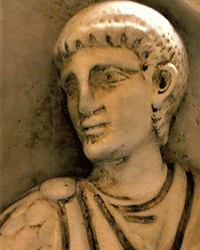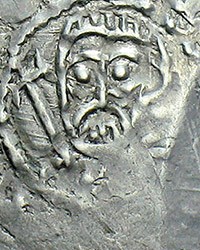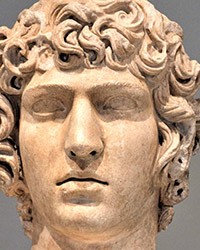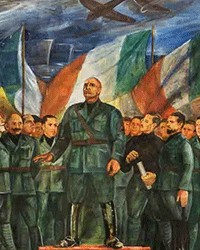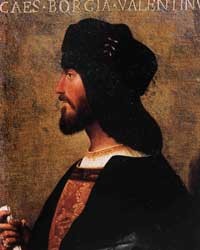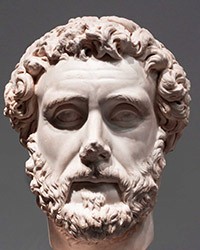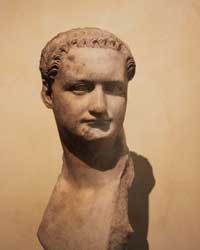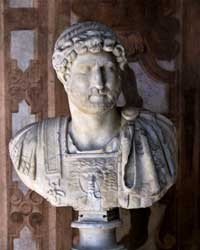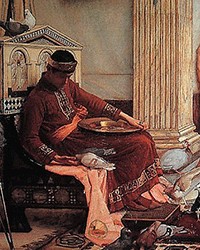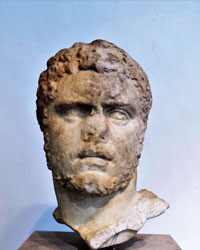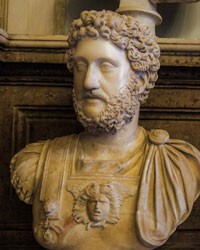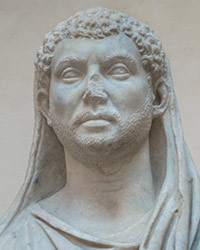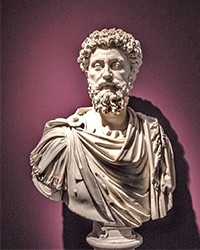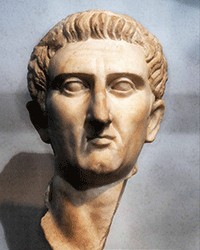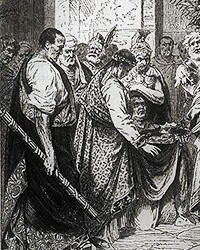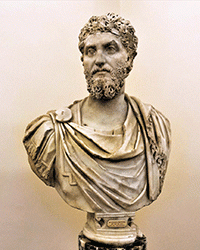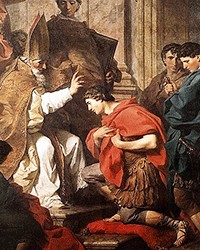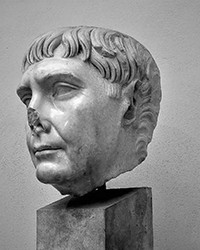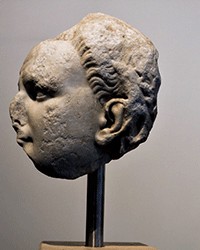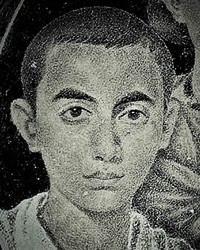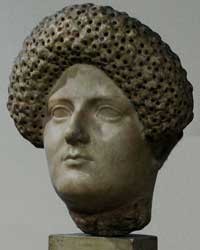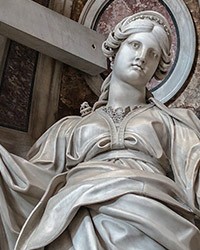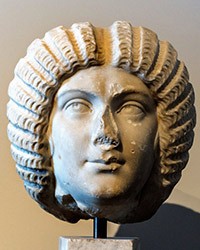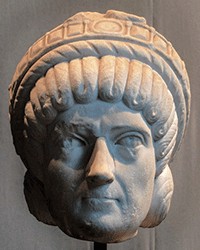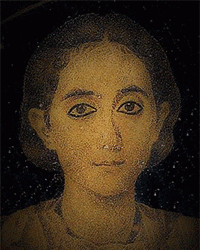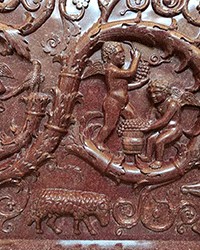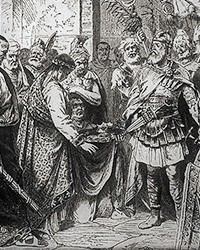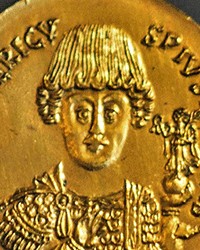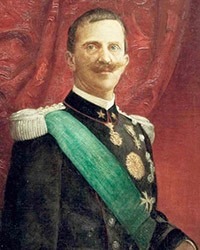
POSTACIE Emperors, leaders and dictators

POSTACIE Emperors, leaders and dictators
Emperors, leaders and dictators
Alberic II (909? – 954) – an annihilator of his own mother and a prince of Rome
Antinous (approx. 110–130 A.D.) – a youth, for whom the emperor lost his mind
Benito Mussolini (1883–1945) – successor of emperors; a charismatic and adored leader
Emperor Antoninus Pius (86–161) – a god-fearing, reasonable and just host
Emperor Domitian (51–96) - a great constructor and a despot hated by the Senate
Emperor Hadrian (76–138) – a traveler and an admirer of Greek culture
Emperor Honorius (384–423) – the one, who allowed Rome to be plundered
Emperor Caracalla (188–217) – a brutal madman or a victim of propaganda?
Emperor Commodus (161–192) – an unfortunate son of a great father
Cesarz Konstantyn Wielki – wybitny strateg i pierwszy chrześcijański władca
Emperor Maxentius (278–312) – an oppressor or a victim of a black legend?
Emperor Marcus Aurelius (121–180)– a philosopher on the imperial throne
Emperor Romulus Augustulus (approx. 463–ok. 536) – the last emperor of the Western Empire and….nothing more
Emperor Septimius Severus (145–211) – the one, who made the army into a leading force in the empire
Emperor Theodosius the Great (347–395) – the one, who turned imperium Romanum into imperium Christianum
Emperor Trajan (53–117) – the ideal Roman ruler – courageous, generous and on good terms with the Senate
Emperor Titus (39–81) – the conqueror of Jerusalem and lover of Berenice
Emperor Velentinian III (419–455) – the pathetic mutiny of a marginalized ruler
Empress Domitia Longina (53?–128?) – respected and condemned, the fate of the wife of the last Flavian
Helena – from an innkeeper to a saint, meaning how legends are made
Empress Julia Domna (150/160? – 217) – an ambitious ruler and an unhappy mother
Galla Placidia (390–450) – an exceptional woman, worth as much as several tons of grain
Honoria (418–455?) – an emancipator or a tool of political calculations?
Odoacer (433–493) – the fall of the empire, meaning how an intelligent illiterate became a Roman king
Theodoric the Great (441–526) – a barbarian, for whom Romans erected monuments
Zgodnie z art. 13 ust. 1 i ust. 2 rozporządzenia Parlamentu Europejskiego i Rady (UE) 2016/679 z 27 kwietnia 2016 r. w sprawie ochrony osób fizycznych w związku z przetwarzaniem danych osobowych i w sprawie swobodnego przepływu takich danych oraz uchylenia dyrektywy 95/46/WE (RODO), informujemy, że Administratorem Pani/Pana danych osobowych jest firma: Econ-sk GmbH, Billbrookdeich 103, 22113 Hamburg, Niemcy
Przetwarzanie Pani/Pana danych osobowych będzie się odbywać na podstawie art. 6 RODO i w celu marketingowym Administrator powołuje się na prawnie uzasadniony interes, którym jest zbieranie danych statystycznych i analizowanie ruchu na stronie internetowej. Podanie danych osobowych na stronie internetowej http://roma-nonpertutti.com/ jest dobrowolne.
| Params | |
|---|---|
| 0 | |
| 1 | |
| 2 | |
| 3 | |
| 4 | |
| 5 | |
| 6 | |
| 7 | |
| 8 | |
| 9 | |
| Params | |
|---|---|
| 0 | |
| 1 | |
| 2 | |
| 3 | |
| 4 | |
| 5 | |
| 6 | |
| 7 | |
| 8 | |
| 9 | |
| 10 | |
| 11 | |
| 12 | |
| 13 | |
| 14 | |
| 15 | |
| 16 | |
| Params | |
|---|---|
| 0 | |
| 1 | |
| 2 | |
| 3 | |
| 4 | |
| 5 | |
| 6 | |
| 7 | |
| 8 | |
| 9 | |
| 10 | |
| 11 | |
| 12 | |
| 13 | |
| 14 | |
| 15 | |
| 16 | |
| Params | |
|---|---|
| 0 | |
| Params | |
|---|---|
| 0 | |
| 1 | |
| 2 | |
| 3 | |
| 4 | |
| 5 | |
| 6 | |
| 7 | |
| 8 | |
| 9 | |
| 10 | |
| 11 | |
| 12 | |
| 13 | |
| 14 | |
| 15 | |
| 16 | |
| Params | |
|---|---|
| 0 | |
| 1 | |
| 2 | |
| 3 | |
| 4 | |
| 5 | |
| 6 | |
| 7 | |
| 8 | |
| 9 | |
| 10 | |
| 11 | |
| 12 | |
| 13 | |
| 14 | |
| 15 | |
| 16 | |
| Params | |
|---|---|
| 0 | |
| 1 | |
| 2 | |
| 3 | |
| 4 | |
| 5 | |
| 6 | |
| 7 | |
| 8 | |
| 9 | |
| 10 | |
| 11 | |
| 12 | |
| 13 | |
| 14 | |
| 15 | |
| 16 | |
| Params | |
|---|---|
| 0 | |
| 1 | |
| 2 | |
| 3 | |
| 4 | |
| 5 | |
| 6 | |
| 7 | |
| 8 | |
| 9 | |
| 10 | |
| 11 | |
| 12 | |
| 13 | |
| 14 | |
| 15 | |
| 16 | |
| 17 | |
| 18 | |
| 19 | |
| 20 | |
| 21 | |
| 22 | |
select * from `articles_categories` where (`parent_id` is null and `status` = 'ACTIVE')4.4msbaza5943_roma| Metadata | |
|---|---|
| Bindings |
|
| Hints |
|
select * from `attributes` where (`table` = 'articles_categories')550μsbaza5943_roma| Metadata | |
|---|---|
| Bindings |
|
| Hints |
|
select * from `attributes_varchar` where `attribute_id` = '1' and `entity_id` = '1' and `lang` = 'en'530μsbaza5943_roma| Metadata | |
|---|---|
| Bindings |
|
| Hints |
|
select * from `articles_categories` where (`parent_id` = '1' and `status` = 'ACTIVE')340μsbaza5943_roma| Metadata | |
|---|---|
| Bindings |
|
| Hints |
|
select * from `attributes` where (`table` = 'articles_categories')400μsbaza5943_roma| Metadata | |
|---|---|
| Bindings |
|
| Hints |
|
select * from `attributes_varchar` where `attribute_id` = '1' and `entity_id` = '2' and `lang` = 'en'440μsbaza5943_roma| Metadata | |
|---|---|
| Bindings |
|
| Hints |
|
select * from `articles_categories` where (`parent_id` = '2' and `status` = 'ACTIVE')430μsbaza5943_roma| Metadata | |
|---|---|
| Bindings |
|
| Hints |
|
select * from `attributes` where (`table` = 'articles_categories')490μsbaza5943_roma| Metadata | |
|---|---|
| Bindings |
|
| Hints |
|
select * from `attributes_varchar` where `attribute_id` = '1' and `entity_id` = '3' and `lang` = 'en'610μsbaza5943_roma| Metadata | |
|---|---|
| Bindings |
|
| Hints |
|
select * from `articles_categories` where (`parent_id` = '3' and `status` = 'ACTIVE')420μsbaza5943_roma| Metadata | |
|---|---|
| Bindings |
|
| Hints |
|
select * from `attributes` where (`table` = 'articles_categories')400μsbaza5943_roma| Metadata | |
|---|---|
| Bindings |
|
| Hints |
|
select * from `attributes_varchar` where `attribute_id` = '1' and `entity_id` = '4' and `lang` = 'en'430μsbaza5943_roma| Metadata | |
|---|---|
| Bindings |
|
| Hints |
|
select * from `articles_categories` where (`parent_id` = '4' and `status` = 'ACTIVE')450μsbaza5943_roma| Metadata | |
|---|---|
| Bindings |
|
| Hints |
|
select * from `attributes` where (`table` = 'articles_categories')500μsbaza5943_roma| Metadata | |
|---|---|
| Bindings |
|
| Hints |
|
select * from `attributes_varchar` where `attribute_id` = '1' and `entity_id` = '5' and `lang` = 'en'410μsbaza5943_roma| Metadata | |
|---|---|
| Bindings |
|
| Hints |
|
select * from `articles_categories` where (`parent_id` = '5' and `status` = 'ACTIVE')590μsbaza5943_roma| Metadata | |
|---|---|
| Bindings |
|
| Hints |
|
select * from `attributes` where (`table` = 'articles_categories')410μsbaza5943_roma| Metadata | |
|---|---|
| Bindings |
|
| Hints |
|
select * from `attributes_varchar` where `attribute_id` = '1' and `entity_id` = '8' and `lang` = 'en'450μsbaza5943_roma| Metadata | |
|---|---|
| Bindings |
|
| Hints |
|
select * from `articles_categories` where (`parent_id` = '8' and `status` = 'ACTIVE')570μsbaza5943_roma| Metadata | |
|---|---|
| Bindings |
|
| Hints |
|
select * from `attributes` where (`table` = 'articles_categories')420μsbaza5943_roma| Metadata | |
|---|---|
| Bindings |
|
| Hints |
|
select * from `attributes_varchar` where `attribute_id` = '1' and `entity_id` = '9' and `lang` = 'en'590μsbaza5943_roma| Metadata | |
|---|---|
| Bindings |
|
| Hints |
|
select * from `articles_categories` where (`parent_id` = '9' and `status` = 'ACTIVE')630μsbaza5943_roma| Metadata | |
|---|---|
| Bindings |
|
| Hints |
|
select * from `attributes` where (`table` = 'articles_categories')480μsbaza5943_roma| Metadata | |
|---|---|
| Bindings |
|
| Hints |
|
select * from `attributes_varchar` where `attribute_id` = '1' and `entity_id` = '10' and `lang` = 'en'430μsbaza5943_roma| Metadata | |
|---|---|
| Bindings |
|
| Hints |
|
select * from `articles_categories` where (`parent_id` = '10' and `status` = 'ACTIVE')390μsbaza5943_roma| Metadata | |
|---|---|
| Bindings |
|
| Hints |
|
select * from `attributes` where (`table` = 'articles_categories')490μsbaza5943_roma| Metadata | |
|---|---|
| Bindings |
|
| Hints |
|
select * from `attributes_varchar` where `attribute_id` = '1' and `entity_id` = '11' and `lang` = 'en'570μsbaza5943_roma| Metadata | |
|---|---|
| Bindings |
|
| Hints |
|
select * from `articles_categories` where (`parent_id` = '11' and `status` = 'ACTIVE')340μsbaza5943_roma| Metadata | |
|---|---|
| Bindings |
|
| Hints |
|
select * from `attributes` where (`table` = 'articles_categories')360μsbaza5943_roma| Metadata | |
|---|---|
| Bindings |
|
| Hints |
|
select * from `attributes_varchar` where `attribute_id` = '1' and `entity_id` = '12' and `lang` = 'en'400μsbaza5943_roma| Metadata | |
|---|---|
| Bindings |
|
| Hints |
|
select * from `articles_categories` where (`parent_id` = '12' and `status` = 'ACTIVE')390μsbaza5943_roma| Metadata | |
|---|---|
| Bindings |
|
| Hints |
|
select * from `attributes` where (`table` = 'articles_categories')380μsbaza5943_roma| Metadata | |
|---|---|
| Bindings |
|
| Hints |
|
select * from `attributes_varchar` where `attribute_id` = '1' and `entity_id` = '13' and `lang` = 'en'380μsbaza5943_roma| Metadata | |
|---|---|
| Bindings |
|
| Hints |
|
select * from `articles_categories` where (`parent_id` = '13' and `status` = 'ACTIVE')350μsbaza5943_roma| Metadata | |
|---|---|
| Bindings |
|
| Hints |
|
select * from `attributes` where (`table` = 'articles_categories')350μsbaza5943_roma| Metadata | |
|---|---|
| Bindings |
|
| Hints |
|
select * from `attributes_varchar` where `attribute_id` = '1' and `entity_id` = '14' and `lang` = 'en'360μsbaza5943_roma| Metadata | |
|---|---|
| Bindings |
|
| Hints |
|
select * from `articles_categories` where (`parent_id` = '14' and `status` = 'ACTIVE')360μsbaza5943_roma| Metadata | |
|---|---|
| Bindings |
|
| Hints |
|
select * from `attributes` where (`table` = 'articles_categories')350μsbaza5943_roma| Metadata | |
|---|---|
| Bindings |
|
| Hints |
|
select * from `attributes_varchar` where `attribute_id` = '1' and `entity_id` = '15' and `lang` = 'en'360μsbaza5943_roma| Metadata | |
|---|---|
| Bindings |
|
| Hints |
|
select * from `articles_categories` where (`parent_id` = '15' and `status` = 'ACTIVE')350μsbaza5943_roma| Metadata | |
|---|---|
| Bindings |
|
| Hints |
|
select * from `attributes` where (`table` = 'articles_categories')420μsbaza5943_roma| Metadata | |
|---|---|
| Bindings |
|
| Hints |
|
select * from `attributes_varchar` where `attribute_id` = '1' and `entity_id` = '16' and `lang` = 'en'370μsbaza5943_roma| Metadata | |
|---|---|
| Bindings |
|
| Hints |
|
select * from `articles_categories` where (`parent_id` = '16' and `status` = 'ACTIVE')370μsbaza5943_roma| Metadata | |
|---|---|
| Bindings |
|
| Hints |
|
select * from `attributes` where (`table` = 'articles_categories')340μsbaza5943_roma| Metadata | |
|---|---|
| Bindings |
|
| Hints |
|
select * from `attributes_varchar` where `attribute_id` = '1' and `entity_id` = '17' and `lang` = 'en'450μsbaza5943_roma| Metadata | |
|---|---|
| Bindings |
|
| Hints |
|
select * from `articles_categories` where (`parent_id` = '17' and `status` = 'ACTIVE')430μsbaza5943_roma| Metadata | |
|---|---|
| Bindings |
|
| Hints |
|
select * from `attributes` where (`table` = 'articles_categories')360μsbaza5943_roma| Metadata | |
|---|---|
| Bindings |
|
| Hints |
|
select * from `attributes_varchar` where `attribute_id` = '1' and `entity_id` = '18' and `lang` = 'en'400μsbaza5943_roma| Metadata | |
|---|---|
| Bindings |
|
| Hints |
|
select * from `articles_categories` where (`parent_id` = '18' and `status` = 'ACTIVE')350μsbaza5943_roma| Metadata | |
|---|---|
| Bindings |
|
| Hints |
|
select * from `attributes` where (`table` = 'articles_categories')350μsbaza5943_roma| Metadata | |
|---|---|
| Bindings |
|
| Hints |
|
select * from `attributes_varchar` where `attribute_id` = '1' and `entity_id` = '19' and `lang` = 'en'320μsbaza5943_roma| Metadata | |
|---|---|
| Bindings |
|
| Hints |
|
select * from `articles_categories` where (`parent_id` = '19' and `status` = 'ACTIVE')330μsbaza5943_roma| Metadata | |
|---|---|
| Bindings |
|
| Hints |
|
select * from `attributes` where (`table` = 'articles_categories')320μsbaza5943_roma| Metadata | |
|---|---|
| Bindings |
|
| Hints |
|
select * from `attributes_varchar` where `attribute_id` = '1' and `entity_id` = '20' and `lang` = 'en'340μsbaza5943_roma| Metadata | |
|---|---|
| Bindings |
|
| Hints |
|
select * from `articles_categories` where (`parent_id` = '20' and `status` = 'ACTIVE')490μsbaza5943_roma| Metadata | |
|---|---|
| Bindings |
|
| Hints |
|
select * from `attributes` where (`table` = 'articles_categories')370μsbaza5943_roma| Metadata | |
|---|---|
| Bindings |
|
| Hints |
|
select * from `attributes_varchar` where `attribute_id` = '1' and `entity_id` = '21' and `lang` = 'en'400μsbaza5943_roma| Metadata | |
|---|---|
| Bindings |
|
| Hints |
|
select * from `articles_categories` where (`parent_id` = '21' and `status` = 'ACTIVE')380μsbaza5943_roma| Metadata | |
|---|---|
| Bindings |
|
| Hints |
|
select * from `attributes` where (`table` = 'articles_categories')320μsbaza5943_roma| Metadata | |
|---|---|
| Bindings |
|
| Hints |
|
select * from `attributes_varchar` where `attribute_id` = '1' and `entity_id` = '22' and `lang` = 'en'370μsbaza5943_roma| Metadata | |
|---|---|
| Bindings |
|
| Hints |
|
select * from `articles_categories` where (`parent_id` = '22' and `status` = 'ACTIVE')450μsbaza5943_roma| Metadata | |
|---|---|
| Bindings |
|
| Hints |
|
select * from `attributes` where (`table` = 'articles_categories')370μsbaza5943_roma| Metadata | |
|---|---|
| Bindings |
|
| Hints |
|
select * from `attributes_varchar` where `attribute_id` = '1' and `entity_id` = '23' and `lang` = 'en'400μsbaza5943_roma| Metadata | |
|---|---|
| Bindings |
|
| Hints |
|
select * from `articles_categories` where (`parent_id` = '23' and `status` = 'ACTIVE')390μsbaza5943_roma| Metadata | |
|---|---|
| Bindings |
|
| Hints |
|
select * from `attributes` where (`table` = 'articles_categories')330μsbaza5943_roma| Metadata | |
|---|---|
| Bindings |
|
| Hints |
|
select * from `attributes_varchar` where `attribute_id` = '1' and `entity_id` = '24' and `lang` = 'en'400μsbaza5943_roma| Metadata | |
|---|---|
| Bindings |
|
| Hints |
|
select * from `articles_categories` where (`parent_id` = '24' and `status` = 'ACTIVE')320μsbaza5943_roma| Metadata | |
|---|---|
| Bindings |
|
| Hints |
|
select * from `attributes` where (`table` = 'articles_categories')370μsbaza5943_roma| Metadata | |
|---|---|
| Bindings |
|
| Hints |
|
select * from `attributes_varchar` where `attribute_id` = '1' and `entity_id` = '25' and `lang` = 'en'330μsbaza5943_roma| Metadata | |
|---|---|
| Bindings |
|
| Hints |
|
select * from `articles_categories` where (`parent_id` = '25' and `status` = 'ACTIVE')480μsbaza5943_roma| Metadata | |
|---|---|
| Bindings |
|
| Hints |
|
select * from `attributes` where (`table` = 'articles_categories')400μsbaza5943_roma| Metadata | |
|---|---|
| Bindings |
|
| Hints |
|
select * from `attributes_varchar` where `attribute_id` = '1' and `entity_id` = '26' and `lang` = 'en'500μsbaza5943_roma| Metadata | |
|---|---|
| Bindings |
|
| Hints |
|
select * from `articles_categories` where (`parent_id` = '26' and `status` = 'ACTIVE')410μsbaza5943_roma| Metadata | |
|---|---|
| Bindings |
|
| Hints |
|
select * from `attributes` where (`table` = 'articles_categories')350μsbaza5943_roma| Metadata | |
|---|---|
| Bindings |
|
| Hints |
|
select * from `attributes_varchar` where `attribute_id` = '1' and `entity_id` = '27' and `lang` = 'en'510μsbaza5943_roma| Metadata | |
|---|---|
| Bindings |
|
| Hints |
|
select * from `articles_categories` where (`parent_id` = '27' and `status` = 'ACTIVE')420μsbaza5943_roma| Metadata | |
|---|---|
| Bindings |
|
| Hints |
|
select * from `attributes` where (`table` = 'articles_categories')330μsbaza5943_roma| Metadata | |
|---|---|
| Bindings |
|
| Hints |
|
select * from `attributes_varchar` where `attribute_id` = '1' and `entity_id` = '28' and `lang` = 'en'380μsbaza5943_roma| Metadata | |
|---|---|
| Bindings |
|
| Hints |
|
select * from `articles_categories` where (`parent_id` = '28' and `status` = 'ACTIVE')380μsbaza5943_roma| Metadata | |
|---|---|
| Bindings |
|
| Hints |
|
select * from `attributes` where (`table` = 'articles_categories')350μsbaza5943_roma| Metadata | |
|---|---|
| Bindings |
|
| Hints |
|
select * from `attributes_varchar` where `attribute_id` = '1' and `entity_id` = '29' and `lang` = 'en'420μsbaza5943_roma| Metadata | |
|---|---|
| Bindings |
|
| Hints |
|
select * from `articles_categories` where (`parent_id` = '29' and `status` = 'ACTIVE')370μsbaza5943_roma| Metadata | |
|---|---|
| Bindings |
|
| Hints |
|
select * from `settings`380μsbaza5943_roma| Metadata | |
|---|---|
| Hints |
|
select * from `articles_categories` where `articles_categories`.`id` = '8' limit 1420μsbaza5943_roma| Metadata | |
|---|---|
| Bindings |
|
| Hints |
|
select * from `articles` where exists (select * from `articles_categories` inner join `articles_categories_join` on `articles_categories`.`id` = `articles_categories_join`.`category_id` where `articles`.`id` = `articles_categories_join`.`article_id` and `status` = 'ACTIVE') and `articles`.`deleted_at` is null order by `created_at` desc limit 3490μsbaza5943_roma| Metadata | |
|---|---|
| Bindings |
|
| Hints |
|
select * from `attributes` where (`table` = 'articles')610μsbaza5943_roma| Metadata | |
|---|---|
| Bindings |
|
| Hints |
|
select * from `attributes_varchar` where `attribute_id` = '2' and `entity_id` = '559' and `lang` = 'en'320μsbaza5943_roma| Metadata | |
|---|---|
| Bindings |
|
| Hints |
|
select * from `attributes_text` where `attribute_id` = '3' and `entity_id` = '559' and `lang` = 'en'400μsbaza5943_roma| Metadata | |
|---|---|
| Bindings |
|
| Hints |
|
select * from `attributes_text` where `attribute_id` = '6' and `entity_id` = '559' and `lang` = 'en'390μsbaza5943_roma| Metadata | |
|---|---|
| Bindings |
|
| Hints |
|
select * from `urls` where `table` = 'articles' and `entity_id` = '559'370μsbaza5943_roma| Metadata | |
|---|---|
| Bindings |
|
| Hints |
|
select * from `articles_photos` where `article_id` = '559'440μsbaza5943_roma| Metadata | |
|---|---|
| Bindings |
|
| Hints |
|
select * from `attributes` where (`table` = 'articles_photos')710μsbaza5943_roma| Metadata | |
|---|---|
| Bindings |
|
| Hints |
|
select * from `attributes_varchar` where `attribute_id` = '5' and `entity_id` = '8010' and `lang` = 'en'440μsbaza5943_roma| Metadata | |
|---|---|
| Bindings |
|
| Hints |
|
select * from `attributes` where (`table` = 'articles_photos')390μsbaza5943_roma| Metadata | |
|---|---|
| Bindings |
|
| Hints |
|
select * from `attributes_varchar` where `attribute_id` = '5' and `entity_id` = '8011' and `lang` = 'en'390μsbaza5943_roma| Metadata | |
|---|---|
| Bindings |
|
| Hints |
|
select * from `attributes` where (`table` = 'articles_photos')330μsbaza5943_roma| Metadata | |
|---|---|
| Bindings |
|
| Hints |
|
select * from `attributes_varchar` where `attribute_id` = '5' and `entity_id` = '8012' and `lang` = 'en'480μsbaza5943_roma| Metadata | |
|---|---|
| Bindings |
|
| Hints |
|
select * from `attributes` where (`table` = 'articles_photos')400μsbaza5943_roma| Metadata | |
|---|---|
| Bindings |
|
| Hints |
|
select * from `attributes_varchar` where `attribute_id` = '5' and `entity_id` = '8013' and `lang` = 'en'470μsbaza5943_roma| Metadata | |
|---|---|
| Bindings |
|
| Hints |
|
select * from `attributes` where (`table` = 'articles_photos')410μsbaza5943_roma| Metadata | |
|---|---|
| Bindings |
|
| Hints |
|
select * from `attributes_varchar` where `attribute_id` = '5' and `entity_id` = '8014' and `lang` = 'en'340μsbaza5943_roma| Metadata | |
|---|---|
| Bindings |
|
| Hints |
|
select * from `attributes` where (`table` = 'articles_photos')360μsbaza5943_roma| Metadata | |
|---|---|
| Bindings |
|
| Hints |
|
select * from `attributes_varchar` where `attribute_id` = '5' and `entity_id` = '8015' and `lang` = 'en'520μsbaza5943_roma| Metadata | |
|---|---|
| Bindings |
|
| Hints |
|
select * from `articles_photos` where `article_id` = '559' and `main_photo` = '1'420μsbaza5943_roma| Metadata | |
|---|---|
| Bindings |
|
| Hints |
|
select * from `attributes` where (`table` = 'articles_photos')370μsbaza5943_roma| Metadata | |
|---|---|
| Bindings |
|
| Hints |
|
select * from `attributes_varchar` where `attribute_id` = '5' and `entity_id` = '8010' and `lang` = 'en'510μsbaza5943_roma| Metadata | |
|---|---|
| Bindings |
|
| Hints |
|
select * from `attributes` where (`table` = 'articles')580μsbaza5943_roma| Metadata | |
|---|---|
| Bindings |
|
| Hints |
|
select * from `attributes_varchar` where `attribute_id` = '2' and `entity_id` = '558' and `lang` = 'en'580μsbaza5943_roma| Metadata | |
|---|---|
| Bindings |
|
| Hints |
|
select * from `attributes_text` where `attribute_id` = '3' and `entity_id` = '558' and `lang` = 'en'470μsbaza5943_roma| Metadata | |
|---|---|
| Bindings |
|
| Hints |
|
select * from `attributes_text` where `attribute_id` = '6' and `entity_id` = '558' and `lang` = 'en'440μsbaza5943_roma| Metadata | |
|---|---|
| Bindings |
|
| Hints |
|
select * from `urls` where `table` = 'articles' and `entity_id` = '558'430μsbaza5943_roma| Metadata | |
|---|---|
| Bindings |
|
| Hints |
|
select * from `articles_photos` where `article_id` = '558'580μsbaza5943_roma| Metadata | |
|---|---|
| Bindings |
|
| Hints |
|
select * from `attributes` where (`table` = 'articles_photos')340μsbaza5943_roma| Metadata | |
|---|---|
| Bindings |
|
| Hints |
|
select * from `attributes_varchar` where `attribute_id` = '5' and `entity_id` = '7991' and `lang` = 'en'580μsbaza5943_roma| Metadata | |
|---|---|
| Bindings |
|
| Hints |
|
select * from `attributes` where (`table` = 'articles_photos')510μsbaza5943_roma| Metadata | |
|---|---|
| Bindings |
|
| Hints |
|
select * from `attributes_varchar` where `attribute_id` = '5' and `entity_id` = '7992' and `lang` = 'en'400μsbaza5943_roma| Metadata | |
|---|---|
| Bindings |
|
| Hints |
|
select * from `attributes` where (`table` = 'articles_photos')410μsbaza5943_roma| Metadata | |
|---|---|
| Bindings |
|
| Hints |
|
select * from `attributes_varchar` where `attribute_id` = '5' and `entity_id` = '7993' and `lang` = 'en'480μsbaza5943_roma| Metadata | |
|---|---|
| Bindings |
|
| Hints |
|
select * from `attributes` where (`table` = 'articles_photos')330μsbaza5943_roma| Metadata | |
|---|---|
| Bindings |
|
| Hints |
|
select * from `attributes_varchar` where `attribute_id` = '5' and `entity_id` = '7994' and `lang` = 'en'290μsbaza5943_roma| Metadata | |
|---|---|
| Bindings |
|
| Hints |
|
select * from `attributes` where (`table` = 'articles_photos')310μsbaza5943_roma| Metadata | |
|---|---|
| Bindings |
|
| Hints |
|
select * from `attributes_varchar` where `attribute_id` = '5' and `entity_id` = '7995' and `lang` = 'en'300μsbaza5943_roma| Metadata | |
|---|---|
| Bindings |
|
| Hints |
|
select * from `attributes` where (`table` = 'articles_photos')390μsbaza5943_roma| Metadata | |
|---|---|
| Bindings |
|
| Hints |
|
select * from `attributes_varchar` where `attribute_id` = '5' and `entity_id` = '7996' and `lang` = 'en'410μsbaza5943_roma| Metadata | |
|---|---|
| Bindings |
|
| Hints |
|
select * from `attributes` where (`table` = 'articles_photos')350μsbaza5943_roma| Metadata | |
|---|---|
| Bindings |
|
| Hints |
|
select * from `attributes_varchar` where `attribute_id` = '5' and `entity_id` = '7998' and `lang` = 'en'430μsbaza5943_roma| Metadata | |
|---|---|
| Bindings |
|
| Hints |
|
select * from `attributes` where (`table` = 'articles_photos')320μsbaza5943_roma| Metadata | |
|---|---|
| Bindings |
|
| Hints |
|
select * from `attributes_varchar` where `attribute_id` = '5' and `entity_id` = '7999' and `lang` = 'en'600μsbaza5943_roma| Metadata | |
|---|---|
| Bindings |
|
| Hints |
|
select * from `attributes` where (`table` = 'articles_photos')370μsbaza5943_roma| Metadata | |
|---|---|
| Bindings |
|
| Hints |
|
select * from `attributes_varchar` where `attribute_id` = '5' and `entity_id` = '8000' and `lang` = 'en'370μsbaza5943_roma| Metadata | |
|---|---|
| Bindings |
|
| Hints |
|
select * from `attributes` where (`table` = 'articles_photos')400μsbaza5943_roma| Metadata | |
|---|---|
| Bindings |
|
| Hints |
|
select * from `attributes_varchar` where `attribute_id` = '5' and `entity_id` = '8001' and `lang` = 'en'330μsbaza5943_roma| Metadata | |
|---|---|
| Bindings |
|
| Hints |
|
select * from `attributes` where (`table` = 'articles_photos')300μsbaza5943_roma| Metadata | |
|---|---|
| Bindings |
|
| Hints |
|
select * from `attributes_varchar` where `attribute_id` = '5' and `entity_id` = '8002' and `lang` = 'en'290μsbaza5943_roma| Metadata | |
|---|---|
| Bindings |
|
| Hints |
|
select * from `attributes` where (`table` = 'articles_photos')320μsbaza5943_roma| Metadata | |
|---|---|
| Bindings |
|
| Hints |
|
select * from `attributes_varchar` where `attribute_id` = '5' and `entity_id` = '8003' and `lang` = 'en'290μsbaza5943_roma| Metadata | |
|---|---|
| Bindings |
|
| Hints |
|
select * from `attributes` where (`table` = 'articles_photos')310μsbaza5943_roma| Metadata | |
|---|---|
| Bindings |
|
| Hints |
|
select * from `attributes_varchar` where `attribute_id` = '5' and `entity_id` = '8004' and `lang` = 'en'300μsbaza5943_roma| Metadata | |
|---|---|
| Bindings |
|
| Hints |
|
select * from `attributes` where (`table` = 'articles_photos')310μsbaza5943_roma| Metadata | |
|---|---|
| Bindings |
|
| Hints |
|
select * from `attributes_varchar` where `attribute_id` = '5' and `entity_id` = '8005' and `lang` = 'en'290μsbaza5943_roma| Metadata | |
|---|---|
| Bindings |
|
| Hints |
|
select * from `attributes` where (`table` = 'articles_photos')290μsbaza5943_roma| Metadata | |
|---|---|
| Bindings |
|
| Hints |
|
select * from `attributes_varchar` where `attribute_id` = '5' and `entity_id` = '8006' and `lang` = 'en'290μsbaza5943_roma| Metadata | |
|---|---|
| Bindings |
|
| Hints |
|
select * from `attributes` where (`table` = 'articles_photos')380μsbaza5943_roma| Metadata | |
|---|---|
| Bindings |
|
| Hints |
|
select * from `attributes_varchar` where `attribute_id` = '5' and `entity_id` = '8007' and `lang` = 'en'430μsbaza5943_roma| Metadata | |
|---|---|
| Bindings |
|
| Hints |
|
select * from `attributes` where (`table` = 'articles_photos')420μsbaza5943_roma| Metadata | |
|---|---|
| Bindings |
|
| Hints |
|
select * from `attributes_varchar` where `attribute_id` = '5' and `entity_id` = '8008' and `lang` = 'en'360μsbaza5943_roma| Metadata | |
|---|---|
| Bindings |
|
| Hints |
|
select * from `attributes` where (`table` = 'articles_photos')380μsbaza5943_roma| Metadata | |
|---|---|
| Bindings |
|
| Hints |
|
select * from `attributes_varchar` where `attribute_id` = '5' and `entity_id` = '8009' and `lang` = 'en'320μsbaza5943_roma| Metadata | |
|---|---|
| Bindings |
|
| Hints |
|
select * from `articles_photos` where `article_id` = '558' and `main_photo` = '1'340μsbaza5943_roma| Metadata | |
|---|---|
| Bindings |
|
| Hints |
|
select * from `attributes` where (`table` = 'articles_photos')370μsbaza5943_roma| Metadata | |
|---|---|
| Bindings |
|
| Hints |
|
select * from `attributes_varchar` where `attribute_id` = '5' and `entity_id` = '7993' and `lang` = 'en'580μsbaza5943_roma| Metadata | |
|---|---|
| Bindings |
|
| Hints |
|
select * from `attributes` where (`table` = 'articles')370μsbaza5943_roma| Metadata | |
|---|---|
| Bindings |
|
| Hints |
|
select * from `attributes_varchar` where `attribute_id` = '2' and `entity_id` = '557' and `lang` = 'en'390μsbaza5943_roma| Metadata | |
|---|---|
| Bindings |
|
| Hints |
|
select * from `attributes_text` where `attribute_id` = '3' and `entity_id` = '557' and `lang` = 'en'320μsbaza5943_roma| Metadata | |
|---|---|
| Bindings |
|
| Hints |
|
select * from `attributes_text` where `attribute_id` = '6' and `entity_id` = '557' and `lang` = 'en'440μsbaza5943_roma| Metadata | |
|---|---|
| Bindings |
|
| Hints |
|
select * from `urls` where `table` = 'articles' and `entity_id` = '557'370μsbaza5943_roma| Metadata | |
|---|---|
| Bindings |
|
| Hints |
|
select * from `articles_photos` where `article_id` = '557'490μsbaza5943_roma| Metadata | |
|---|---|
| Bindings |
|
| Hints |
|
select * from `attributes` where (`table` = 'articles_photos')420μsbaza5943_roma| Metadata | |
|---|---|
| Bindings |
|
| Hints |
|
select * from `attributes_varchar` where `attribute_id` = '5' and `entity_id` = '7983' and `lang` = 'en'480μsbaza5943_roma| Metadata | |
|---|---|
| Bindings |
|
| Hints |
|
select * from `attributes` where (`table` = 'articles_photos')390μsbaza5943_roma| Metadata | |
|---|---|
| Bindings |
|
| Hints |
|
select * from `attributes_varchar` where `attribute_id` = '5' and `entity_id` = '7984' and `lang` = 'en'450μsbaza5943_roma| Metadata | |
|---|---|
| Bindings |
|
| Hints |
|
select * from `attributes` where (`table` = 'articles_photos')340μsbaza5943_roma| Metadata | |
|---|---|
| Bindings |
|
| Hints |
|
select * from `attributes_varchar` where `attribute_id` = '5' and `entity_id` = '7985' and `lang` = 'en'400μsbaza5943_roma| Metadata | |
|---|---|
| Bindings |
|
| Hints |
|
select * from `attributes` where (`table` = 'articles_photos')300μsbaza5943_roma| Metadata | |
|---|---|
| Bindings |
|
| Hints |
|
select * from `attributes_varchar` where `attribute_id` = '5' and `entity_id` = '7986' and `lang` = 'en'330μsbaza5943_roma| Metadata | |
|---|---|
| Bindings |
|
| Hints |
|
select * from `attributes` where (`table` = 'articles_photos')260μsbaza5943_roma| Metadata | |
|---|---|
| Bindings |
|
| Hints |
|
select * from `attributes_varchar` where `attribute_id` = '5' and `entity_id` = '7987' and `lang` = 'en'300μsbaza5943_roma| Metadata | |
|---|---|
| Bindings |
|
| Hints |
|
select * from `attributes` where (`table` = 'articles_photos')350μsbaza5943_roma| Metadata | |
|---|---|
| Bindings |
|
| Hints |
|
select * from `attributes_varchar` where `attribute_id` = '5' and `entity_id` = '7988' and `lang` = 'en'430μsbaza5943_roma| Metadata | |
|---|---|
| Bindings |
|
| Hints |
|
select * from `attributes` where (`table` = 'articles_photos')360μsbaza5943_roma| Metadata | |
|---|---|
| Bindings |
|
| Hints |
|
select * from `attributes_varchar` where `attribute_id` = '5' and `entity_id` = '7989' and `lang` = 'en'420μsbaza5943_roma| Metadata | |
|---|---|
| Bindings |
|
| Hints |
|
select * from `attributes` where (`table` = 'articles_photos')300μsbaza5943_roma| Metadata | |
|---|---|
| Bindings |
|
| Hints |
|
select * from `attributes_varchar` where `attribute_id` = '5' and `entity_id` = '7990' and `lang` = 'en'300μsbaza5943_roma| Metadata | |
|---|---|
| Bindings |
|
| Hints |
|
select * from `articles_photos` where `article_id` = '557' and `main_photo` = '1'310μsbaza5943_roma| Metadata | |
|---|---|
| Bindings |
|
| Hints |
|
select * from `attributes` where (`table` = 'articles_photos')330μsbaza5943_roma| Metadata | |
|---|---|
| Bindings |
|
| Hints |
|
select * from `attributes_varchar` where `attribute_id` = '5' and `entity_id` = '7990' and `lang` = 'en'500μsbaza5943_roma| Metadata | |
|---|---|
| Bindings |
|
| Hints |
|
select * from `attributes` where `key` in ('name') and (`table` = 'articles_categories')530μsbaza5943_roma| Metadata | |
|---|---|
| Bindings |
|
| Hints |
|
select * from `attributes_varchar` where `attribute_id` = '1' and `entity_id` = '8' and `lang` = 'en'430μsbaza5943_roma| Metadata | |
|---|---|
| Bindings |
|
| Hints |
|
select * from `articles_categories` where `parent_id` = '8'420μsbaza5943_roma| Metadata | |
|---|---|
| Bindings |
|
| Hints |
|
select * from `attributes` where (`table` = 'articles_categories')360μsbaza5943_roma| Metadata | |
|---|---|
| Bindings |
|
| Hints |
|
select * from `attributes_varchar` where `attribute_id` = '1' and `entity_id` = '9' and `lang` = 'en'450μsbaza5943_roma| Metadata | |
|---|---|
| Bindings |
|
| Hints |
|
select * from `urls` where `table` = 'articles_categories' and `entity_id` = '9'330μsbaza5943_roma| Metadata | |
|---|---|
| Bindings |
|
| Hints |
|
select * from `attributes` where (`table` = 'articles_categories')370μsbaza5943_roma| Metadata | |
|---|---|
| Bindings |
|
| Hints |
|
select * from `attributes_varchar` where `attribute_id` = '1' and `entity_id` = '10' and `lang` = 'en'430μsbaza5943_roma| Metadata | |
|---|---|
| Bindings |
|
| Hints |
|
select * from `urls` where `table` = 'articles_categories' and `entity_id` = '10'490μsbaza5943_roma| Metadata | |
|---|---|
| Bindings |
|
| Hints |
|
select * from `attributes` where (`table` = 'articles_categories')380μsbaza5943_roma| Metadata | |
|---|---|
| Bindings |
|
| Hints |
|
select * from `attributes_varchar` where `attribute_id` = '1' and `entity_id` = '11' and `lang` = 'en'590μsbaza5943_roma| Metadata | |
|---|---|
| Bindings |
|
| Hints |
|
select * from `urls` where `table` = 'articles_categories' and `entity_id` = '11'410μsbaza5943_roma| Metadata | |
|---|---|
| Bindings |
|
| Hints |
|
select * from `articles_tags` where `status` = 'ACTIVE' and `category_id` = '8'360μsbaza5943_roma| Metadata | |
|---|---|
| Bindings |
|
| Hints |
|
select * from `articles_categories` where (`parent_id` = '8')380μsbaza5943_roma| Metadata | |
|---|---|
| Bindings |
|
| Hints |
|
select * from `articles_categories` where (`parent_id` = '9')280μsbaza5943_roma| Metadata | |
|---|---|
| Bindings |
|
| Hints |
|
select * from `articles_categories` where (`parent_id` = '10')290μsbaza5943_roma| Metadata | |
|---|---|
| Bindings |
|
| Hints |
|
select * from `articles_categories` where (`parent_id` = '11')380μsbaza5943_roma| Metadata | |
|---|---|
| Bindings |
|
| Hints |
|
select * from `articles` where exists (select * from `articles_categories` inner join `articles_categories_join` on `articles_categories`.`id` = `articles_categories_join`.`category_id` where `articles`.`id` = `articles_categories_join`.`article_id` and `category_id` in ('8', '11', '10', '9') and `status` = 'ACTIVE') and `articles`.`deleted_at` is null order by `name` asc710μsbaza5943_roma| Metadata | |
|---|---|
| Bindings |
|
| Hints |
|
select * from `attributes` where (`table` = 'articles')520μsbaza5943_roma| Metadata | |
|---|---|
| Bindings |
|
| Hints |
|
select * from `attributes_varchar` where `attribute_id` = '2' and `entity_id` = '243' and `lang` = 'en'500μsbaza5943_roma| Metadata | |
|---|---|
| Bindings |
|
| Hints |
|
select * from `attributes_text` where `attribute_id` = '3' and `entity_id` = '243' and `lang` = 'en'550μsbaza5943_roma| Metadata | |
|---|---|
| Bindings |
|
| Hints |
|
select * from `attributes_text` where `attribute_id` = '6' and `entity_id` = '243' and `lang` = 'en'520μsbaza5943_roma| Metadata | |
|---|---|
| Bindings |
|
| Hints |
|
select * from `urls` where `table` = 'articles' and `entity_id` = '243'470μsbaza5943_roma| Metadata | |
|---|---|
| Bindings |
|
| Hints |
|
select * from `attributes` where (`table` = 'articles')390μsbaza5943_roma| Metadata | |
|---|---|
| Bindings |
|
| Hints |
|
select * from `attributes_varchar` where `attribute_id` = '2' and `entity_id` = '371' and `lang` = 'en'390μsbaza5943_roma| Metadata | |
|---|---|
| Bindings |
|
| Hints |
|
select * from `attributes_text` where `attribute_id` = '3' and `entity_id` = '371' and `lang` = 'en'460μsbaza5943_roma| Metadata | |
|---|---|
| Bindings |
|
| Hints |
|
select * from `attributes_text` where `attribute_id` = '6' and `entity_id` = '371' and `lang` = 'en'530μsbaza5943_roma| Metadata | |
|---|---|
| Bindings |
|
| Hints |
|
select * from `urls` where `table` = 'articles' and `entity_id` = '371'430μsbaza5943_roma| Metadata | |
|---|---|
| Bindings |
|
| Hints |
|
select * from `attributes` where (`table` = 'articles')400μsbaza5943_roma| Metadata | |
|---|---|
| Bindings |
|
| Hints |
|
select * from `attributes_varchar` where `attribute_id` = '2' and `entity_id` = '13' and `lang` = 'en'480μsbaza5943_roma| Metadata | |
|---|---|
| Bindings |
|
| Hints |
|
select * from `attributes_text` where `attribute_id` = '3' and `entity_id` = '13' and `lang` = 'en'500μsbaza5943_roma| Metadata | |
|---|---|
| Bindings |
|
| Hints |
|
select * from `attributes_text` where `attribute_id` = '6' and `entity_id` = '13' and `lang` = 'en'520μsbaza5943_roma| Metadata | |
|---|---|
| Bindings |
|
| Hints |
|
select * from `urls` where `table` = 'articles' and `entity_id` = '13'320μsbaza5943_roma| Metadata | |
|---|---|
| Bindings |
|
| Hints |
|
select * from `attributes` where (`table` = 'articles')340μsbaza5943_roma| Metadata | |
|---|---|
| Bindings |
|
| Hints |
|
select * from `attributes_varchar` where `attribute_id` = '2' and `entity_id` = '208' and `lang` = 'en'380μsbaza5943_roma| Metadata | |
|---|---|
| Bindings |
|
| Hints |
|
select * from `attributes_text` where `attribute_id` = '3' and `entity_id` = '208' and `lang` = 'en'830μsbaza5943_roma| Metadata | |
|---|---|
| Bindings |
|
| Hints |
|
select * from `attributes_text` where `attribute_id` = '6' and `entity_id` = '208' and `lang` = 'en'440μsbaza5943_roma| Metadata | |
|---|---|
| Bindings |
|
| Hints |
|
select * from `urls` where `table` = 'articles' and `entity_id` = '208'370μsbaza5943_roma| Metadata | |
|---|---|
| Bindings |
|
| Hints |
|
select * from `attributes` where (`table` = 'articles')350μsbaza5943_roma| Metadata | |
|---|---|
| Bindings |
|
| Hints |
|
select * from `attributes_varchar` where `attribute_id` = '2' and `entity_id` = '25' and `lang` = 'en'430μsbaza5943_roma| Metadata | |
|---|---|
| Bindings |
|
| Hints |
|
select * from `attributes_text` where `attribute_id` = '3' and `entity_id` = '25' and `lang` = 'en'710μsbaza5943_roma| Metadata | |
|---|---|
| Bindings |
|
| Hints |
|
select * from `attributes_text` where `attribute_id` = '6' and `entity_id` = '25' and `lang` = 'en'380μsbaza5943_roma| Metadata | |
|---|---|
| Bindings |
|
| Hints |
|
select * from `urls` where `table` = 'articles' and `entity_id` = '25'141.32msbaza5943_roma| Metadata | |
|---|---|
| Bindings |
|
| Hints |
|
select * from `attributes` where (`table` = 'articles')470μsbaza5943_roma| Metadata | |
|---|---|
| Bindings |
|
| Hints |
|
select * from `attributes_varchar` where `attribute_id` = '2' and `entity_id` = '14' and `lang` = 'en'470μsbaza5943_roma| Metadata | |
|---|---|
| Bindings |
|
| Hints |
|
select * from `attributes_text` where `attribute_id` = '3' and `entity_id` = '14' and `lang` = 'en'460μsbaza5943_roma| Metadata | |
|---|---|
| Bindings |
|
| Hints |
|
select * from `attributes_text` where `attribute_id` = '6' and `entity_id` = '14' and `lang` = 'en'600μsbaza5943_roma| Metadata | |
|---|---|
| Bindings |
|
| Hints |
|
select * from `urls` where `table` = 'articles' and `entity_id` = '14'410μsbaza5943_roma| Metadata | |
|---|---|
| Bindings |
|
| Hints |
|
select * from `attributes` where (`table` = 'articles')400μsbaza5943_roma| Metadata | |
|---|---|
| Bindings |
|
| Hints |
|
select * from `attributes_varchar` where `attribute_id` = '2' and `entity_id` = '46' and `lang` = 'en'410μsbaza5943_roma| Metadata | |
|---|---|
| Bindings |
|
| Hints |
|
select * from `attributes_text` where `attribute_id` = '3' and `entity_id` = '46' and `lang` = 'en'480μsbaza5943_roma| Metadata | |
|---|---|
| Bindings |
|
| Hints |
|
select * from `attributes_text` where `attribute_id` = '6' and `entity_id` = '46' and `lang` = 'en'420μsbaza5943_roma| Metadata | |
|---|---|
| Bindings |
|
| Hints |
|
select * from `urls` where `table` = 'articles' and `entity_id` = '46'450μsbaza5943_roma| Metadata | |
|---|---|
| Bindings |
|
| Hints |
|
select * from `attributes` where (`table` = 'articles')320μsbaza5943_roma| Metadata | |
|---|---|
| Bindings |
|
| Hints |
|
select * from `attributes_varchar` where `attribute_id` = '2' and `entity_id` = '80' and `lang` = 'en'300μsbaza5943_roma| Metadata | |
|---|---|
| Bindings |
|
| Hints |
|
select * from `attributes_text` where `attribute_id` = '3' and `entity_id` = '80' and `lang` = 'en'470μsbaza5943_roma| Metadata | |
|---|---|
| Bindings |
|
| Hints |
|
select * from `attributes_text` where `attribute_id` = '6' and `entity_id` = '80' and `lang` = 'en'410μsbaza5943_roma| Metadata | |
|---|---|
| Bindings |
|
| Hints |
|
select * from `urls` where `table` = 'articles' and `entity_id` = '80'450μsbaza5943_roma| Metadata | |
|---|---|
| Bindings |
|
| Hints |
|
select * from `attributes` where (`table` = 'articles')310μsbaza5943_roma| Metadata | |
|---|---|
| Bindings |
|
| Hints |
|
select * from `attributes_varchar` where `attribute_id` = '2' and `entity_id` = '248' and `lang` = 'en'330μsbaza5943_roma| Metadata | |
|---|---|
| Bindings |
|
| Hints |
|
select * from `attributes_text` where `attribute_id` = '3' and `entity_id` = '248' and `lang` = 'en'500μsbaza5943_roma| Metadata | |
|---|---|
| Bindings |
|
| Hints |
|
select * from `attributes_text` where `attribute_id` = '6' and `entity_id` = '248' and `lang` = 'en'480μsbaza5943_roma| Metadata | |
|---|---|
| Bindings |
|
| Hints |
|
select * from `urls` where `table` = 'articles' and `entity_id` = '248'410μsbaza5943_roma| Metadata | |
|---|---|
| Bindings |
|
| Hints |
|
select * from `attributes` where (`table` = 'articles')400μsbaza5943_roma| Metadata | |
|---|---|
| Bindings |
|
| Hints |
|
select * from `attributes_varchar` where `attribute_id` = '2' and `entity_id` = '118' and `lang` = 'en'360μsbaza5943_roma| Metadata | |
|---|---|
| Bindings |
|
| Hints |
|
select * from `attributes_text` where `attribute_id` = '3' and `entity_id` = '118' and `lang` = 'en'530μsbaza5943_roma| Metadata | |
|---|---|
| Bindings |
|
| Hints |
|
select * from `attributes_text` where `attribute_id` = '6' and `entity_id` = '118' and `lang` = 'en'390μsbaza5943_roma| Metadata | |
|---|---|
| Bindings |
|
| Hints |
|
select * from `urls` where `table` = 'articles' and `entity_id` = '118'400μsbaza5943_roma| Metadata | |
|---|---|
| Bindings |
|
| Hints |
|
select * from `attributes` where (`table` = 'articles')370μsbaza5943_roma| Metadata | |
|---|---|
| Bindings |
|
| Hints |
|
select * from `attributes_varchar` where `attribute_id` = '2' and `entity_id` = '125' and `lang` = 'en'400μsbaza5943_roma| Metadata | |
|---|---|
| Bindings |
|
| Hints |
|
select * from `attributes_text` where `attribute_id` = '3' and `entity_id` = '125' and `lang` = 'en'540μsbaza5943_roma| Metadata | |
|---|---|
| Bindings |
|
| Hints |
|
select * from `attributes_text` where `attribute_id` = '6' and `entity_id` = '125' and `lang` = 'en'400μsbaza5943_roma| Metadata | |
|---|---|
| Bindings |
|
| Hints |
|
select * from `urls` where `table` = 'articles' and `entity_id` = '125'630μsbaza5943_roma| Metadata | |
|---|---|
| Bindings |
|
| Hints |
|
select * from `attributes` where (`table` = 'articles')840μsbaza5943_roma| Metadata | |
|---|---|
| Bindings |
|
| Hints |
|
select * from `attributes_varchar` where `attribute_id` = '2' and `entity_id` = '515' and `lang` = 'en'810μsbaza5943_roma| Metadata | |
|---|---|
| Bindings |
|
| Hints |
|
select * from `attributes_text` where `attribute_id` = '3' and `entity_id` = '515' and `lang` = 'en'1.3msbaza5943_roma| Metadata | |
|---|---|
| Bindings |
|
| Hints |
|
select * from `attributes_text` where `attribute_id` = '6' and `entity_id` = '515' and `lang` = 'en'1.16msbaza5943_roma| Metadata | |
|---|---|
| Bindings |
|
| Hints |
|
select * from `urls` where `table` = 'articles' and `entity_id` = '515'930μsbaza5943_roma| Metadata | |
|---|---|
| Bindings |
|
| Hints |
|
select * from `attributes` where (`table` = 'articles')1.26msbaza5943_roma| Metadata | |
|---|---|
| Bindings |
|
| Hints |
|
select * from `attributes_varchar` where `attribute_id` = '2' and `entity_id` = '439' and `lang` = 'en'840μsbaza5943_roma| Metadata | |
|---|---|
| Bindings |
|
| Hints |
|
select * from `attributes_text` where `attribute_id` = '3' and `entity_id` = '439' and `lang` = 'en'500μsbaza5943_roma| Metadata | |
|---|---|
| Bindings |
|
| Hints |
|
select * from `attributes_text` where `attribute_id` = '6' and `entity_id` = '439' and `lang` = 'en'440μsbaza5943_roma| Metadata | |
|---|---|
| Bindings |
|
| Hints |
|
select * from `urls` where `table` = 'articles' and `entity_id` = '439'310μsbaza5943_roma| Metadata | |
|---|---|
| Bindings |
|
| Hints |
|
select * from `attributes` where (`table` = 'articles')290μsbaza5943_roma| Metadata | |
|---|---|
| Bindings |
|
| Hints |
|
select * from `attributes_varchar` where `attribute_id` = '2' and `entity_id` = '167' and `lang` = 'en'350μsbaza5943_roma| Metadata | |
|---|---|
| Bindings |
|
| Hints |
|
select * from `attributes_text` where `attribute_id` = '3' and `entity_id` = '167' and `lang` = 'en'490μsbaza5943_roma| Metadata | |
|---|---|
| Bindings |
|
| Hints |
|
select * from `attributes_text` where `attribute_id` = '6' and `entity_id` = '167' and `lang` = 'en'810μsbaza5943_roma| Metadata | |
|---|---|
| Bindings |
|
| Hints |
|
select * from `urls` where `table` = 'articles' and `entity_id` = '167'550μsbaza5943_roma| Metadata | |
|---|---|
| Bindings |
|
| Hints |
|
select * from `attributes` where (`table` = 'articles')330μsbaza5943_roma| Metadata | |
|---|---|
| Bindings |
|
| Hints |
|
select * from `attributes_varchar` where `attribute_id` = '2' and `entity_id` = '209' and `lang` = 'en'380μsbaza5943_roma| Metadata | |
|---|---|
| Bindings |
|
| Hints |
|
select * from `attributes_text` where `attribute_id` = '3' and `entity_id` = '209' and `lang` = 'en'380μsbaza5943_roma| Metadata | |
|---|---|
| Bindings |
|
| Hints |
|
select * from `attributes_text` where `attribute_id` = '6' and `entity_id` = '209' and `lang` = 'en'450μsbaza5943_roma| Metadata | |
|---|---|
| Bindings |
|
| Hints |
|
select * from `urls` where `table` = 'articles' and `entity_id` = '209'430μsbaza5943_roma| Metadata | |
|---|---|
| Bindings |
|
| Hints |
|
select * from `attributes` where (`table` = 'articles')240μsbaza5943_roma| Metadata | |
|---|---|
| Bindings |
|
| Hints |
|
select * from `attributes_varchar` where `attribute_id` = '2' and `entity_id` = '251' and `lang` = 'en'380μsbaza5943_roma| Metadata | |
|---|---|
| Bindings |
|
| Hints |
|
select * from `attributes_text` where `attribute_id` = '3' and `entity_id` = '251' and `lang` = 'en'460μsbaza5943_roma| Metadata | |
|---|---|
| Bindings |
|
| Hints |
|
select * from `attributes_text` where `attribute_id` = '6' and `entity_id` = '251' and `lang` = 'en'460μsbaza5943_roma| Metadata | |
|---|---|
| Bindings |
|
| Hints |
|
select * from `urls` where `table` = 'articles' and `entity_id` = '251'370μsbaza5943_roma| Metadata | |
|---|---|
| Bindings |
|
| Hints |
|
select * from `attributes` where (`table` = 'articles')250μsbaza5943_roma| Metadata | |
|---|---|
| Bindings |
|
| Hints |
|
select * from `attributes_varchar` where `attribute_id` = '2' and `entity_id` = '104' and `lang` = 'en'270μsbaza5943_roma| Metadata | |
|---|---|
| Bindings |
|
| Hints |
|
select * from `attributes_text` where `attribute_id` = '3' and `entity_id` = '104' and `lang` = 'en'670μsbaza5943_roma| Metadata | |
|---|---|
| Bindings |
|
| Hints |
|
select * from `attributes_text` where `attribute_id` = '6' and `entity_id` = '104' and `lang` = 'en'410μsbaza5943_roma| Metadata | |
|---|---|
| Bindings |
|
| Hints |
|
select * from `urls` where `table` = 'articles' and `entity_id` = '104'430μsbaza5943_roma| Metadata | |
|---|---|
| Bindings |
|
| Hints |
|
select * from `attributes` where (`table` = 'articles')370μsbaza5943_roma| Metadata | |
|---|---|
| Bindings |
|
| Hints |
|
select * from `attributes_varchar` where `attribute_id` = '2' and `entity_id` = '258' and `lang` = 'en'390μsbaza5943_roma| Metadata | |
|---|---|
| Bindings |
|
| Hints |
|
select * from `attributes_text` where `attribute_id` = '3' and `entity_id` = '258' and `lang` = 'en'550μsbaza5943_roma| Metadata | |
|---|---|
| Bindings |
|
| Hints |
|
select * from `attributes_text` where `attribute_id` = '6' and `entity_id` = '258' and `lang` = 'en'570μsbaza5943_roma| Metadata | |
|---|---|
| Bindings |
|
| Hints |
|
select * from `urls` where `table` = 'articles' and `entity_id` = '258'400μsbaza5943_roma| Metadata | |
|---|---|
| Bindings |
|
| Hints |
|
select * from `attributes` where (`table` = 'articles')370μsbaza5943_roma| Metadata | |
|---|---|
| Bindings |
|
| Hints |
|
select * from `attributes_varchar` where `attribute_id` = '2' and `entity_id` = '239' and `lang` = 'en'330μsbaza5943_roma| Metadata | |
|---|---|
| Bindings |
|
| Hints |
|
select * from `attributes_text` where `attribute_id` = '3' and `entity_id` = '239' and `lang` = 'en'640μsbaza5943_roma| Metadata | |
|---|---|
| Bindings |
|
| Hints |
|
select * from `attributes_text` where `attribute_id` = '6' and `entity_id` = '239' and `lang` = 'en'530μsbaza5943_roma| Metadata | |
|---|---|
| Bindings |
|
| Hints |
|
select * from `urls` where `table` = 'articles' and `entity_id` = '239'370μsbaza5943_roma| Metadata | |
|---|---|
| Bindings |
|
| Hints |
|
select * from `attributes` where (`table` = 'articles')360μsbaza5943_roma| Metadata | |
|---|---|
| Bindings |
|
| Hints |
|
select * from `attributes_varchar` where `attribute_id` = '2' and `entity_id` = '101' and `lang` = 'en'600μsbaza5943_roma| Metadata | |
|---|---|
| Bindings |
|
| Hints |
|
select * from `attributes_text` where `attribute_id` = '3' and `entity_id` = '101' and `lang` = 'en'700μsbaza5943_roma| Metadata | |
|---|---|
| Bindings |
|
| Hints |
|
select * from `attributes_text` where `attribute_id` = '6' and `entity_id` = '101' and `lang` = 'en'400μsbaza5943_roma| Metadata | |
|---|---|
| Bindings |
|
| Hints |
|
select * from `urls` where `table` = 'articles' and `entity_id` = '101'330μsbaza5943_roma| Metadata | |
|---|---|
| Bindings |
|
| Hints |
|
select * from `attributes` where (`table` = 'articles')400μsbaza5943_roma| Metadata | |
|---|---|
| Bindings |
|
| Hints |
|
select * from `attributes_varchar` where `attribute_id` = '2' and `entity_id` = '259' and `lang` = 'en'350μsbaza5943_roma| Metadata | |
|---|---|
| Bindings |
|
| Hints |
|
select * from `attributes_text` where `attribute_id` = '3' and `entity_id` = '259' and `lang` = 'en'720μsbaza5943_roma| Metadata | |
|---|---|
| Bindings |
|
| Hints |
|
select * from `attributes_text` where `attribute_id` = '6' and `entity_id` = '259' and `lang` = 'en'410μsbaza5943_roma| Metadata | |
|---|---|
| Bindings |
|
| Hints |
|
select * from `urls` where `table` = 'articles' and `entity_id` = '259'380μsbaza5943_roma| Metadata | |
|---|---|
| Bindings |
|
| Hints |
|
select * from `attributes` where (`table` = 'articles')520μsbaza5943_roma| Metadata | |
|---|---|
| Bindings |
|
| Hints |
|
select * from `attributes_varchar` where `attribute_id` = '2' and `entity_id` = '45' and `lang` = 'en'320μsbaza5943_roma| Metadata | |
|---|---|
| Bindings |
|
| Hints |
|
select * from `attributes_text` where `attribute_id` = '3' and `entity_id` = '45' and `lang` = 'en'530μsbaza5943_roma| Metadata | |
|---|---|
| Bindings |
|
| Hints |
|
select * from `attributes_text` where `attribute_id` = '6' and `entity_id` = '45' and `lang` = 'en'430μsbaza5943_roma| Metadata | |
|---|---|
| Bindings |
|
| Hints |
|
select * from `urls` where `table` = 'articles' and `entity_id` = '45'310μsbaza5943_roma| Metadata | |
|---|---|
| Bindings |
|
| Hints |
|
select * from `attributes` where (`table` = 'articles')390μsbaza5943_roma| Metadata | |
|---|---|
| Bindings |
|
| Hints |
|
select * from `attributes_varchar` where `attribute_id` = '2' and `entity_id` = '349' and `lang` = 'en'560μsbaza5943_roma| Metadata | |
|---|---|
| Bindings |
|
| Hints |
|
select * from `attributes_text` where `attribute_id` = '3' and `entity_id` = '349' and `lang` = 'en'700μsbaza5943_roma| Metadata | |
|---|---|
| Bindings |
|
| Hints |
|
select * from `attributes_text` where `attribute_id` = '6' and `entity_id` = '349' and `lang` = 'en'390μsbaza5943_roma| Metadata | |
|---|---|
| Bindings |
|
| Hints |
|
select * from `urls` where `table` = 'articles' and `entity_id` = '349'330μsbaza5943_roma| Metadata | |
|---|---|
| Bindings |
|
| Hints |
|
select * from `attributes` where (`table` = 'articles')340μsbaza5943_roma| Metadata | |
|---|---|
| Bindings |
|
| Hints |
|
select * from `attributes_varchar` where `attribute_id` = '2' and `entity_id` = '114' and `lang` = 'en'340μsbaza5943_roma| Metadata | |
|---|---|
| Bindings |
|
| Hints |
|
select * from `attributes_text` where `attribute_id` = '3' and `entity_id` = '114' and `lang` = 'en'500μsbaza5943_roma| Metadata | |
|---|---|
| Bindings |
|
| Hints |
|
select * from `attributes_text` where `attribute_id` = '6' and `entity_id` = '114' and `lang` = 'en'410μsbaza5943_roma| Metadata | |
|---|---|
| Bindings |
|
| Hints |
|
select * from `urls` where `table` = 'articles' and `entity_id` = '114'360μsbaza5943_roma| Metadata | |
|---|---|
| Bindings |
|
| Hints |
|
select * from `attributes` where (`table` = 'articles')330μsbaza5943_roma| Metadata | |
|---|---|
| Bindings |
|
| Hints |
|
select * from `attributes_varchar` where `attribute_id` = '2' and `entity_id` = '245' and `lang` = 'en'360μsbaza5943_roma| Metadata | |
|---|---|
| Bindings |
|
| Hints |
|
select * from `attributes_text` where `attribute_id` = '3' and `entity_id` = '245' and `lang` = 'en'520μsbaza5943_roma| Metadata | |
|---|---|
| Bindings |
|
| Hints |
|
select * from `attributes_text` where `attribute_id` = '6' and `entity_id` = '245' and `lang` = 'en'560μsbaza5943_roma| Metadata | |
|---|---|
| Bindings |
|
| Hints |
|
select * from `urls` where `table` = 'articles' and `entity_id` = '245'530μsbaza5943_roma| Metadata | |
|---|---|
| Bindings |
|
| Hints |
|
select * from `attributes` where (`table` = 'articles')400μsbaza5943_roma| Metadata | |
|---|---|
| Bindings |
|
| Hints |
|
select * from `attributes_varchar` where `attribute_id` = '2' and `entity_id` = '247' and `lang` = 'en'350μsbaza5943_roma| Metadata | |
|---|---|
| Bindings |
|
| Hints |
|
select * from `attributes_text` where `attribute_id` = '3' and `entity_id` = '247' and `lang` = 'en'570μsbaza5943_roma| Metadata | |
|---|---|
| Bindings |
|
| Hints |
|
select * from `attributes_text` where `attribute_id` = '6' and `entity_id` = '247' and `lang` = 'en'420μsbaza5943_roma| Metadata | |
|---|---|
| Bindings |
|
| Hints |
|
select * from `urls` where `table` = 'articles' and `entity_id` = '247'500μsbaza5943_roma| Metadata | |
|---|---|
| Bindings |
|
| Hints |
|
select * from `attributes` where (`table` = 'articles')370μsbaza5943_roma| Metadata | |
|---|---|
| Bindings |
|
| Hints |
|
select * from `attributes_varchar` where `attribute_id` = '2' and `entity_id` = '126' and `lang` = 'en'350μsbaza5943_roma| Metadata | |
|---|---|
| Bindings |
|
| Hints |
|
select * from `attributes_text` where `attribute_id` = '3' and `entity_id` = '126' and `lang` = 'en'500μsbaza5943_roma| Metadata | |
|---|---|
| Bindings |
|
| Hints |
|
select * from `attributes_text` where `attribute_id` = '6' and `entity_id` = '126' and `lang` = 'en'340μsbaza5943_roma| Metadata | |
|---|---|
| Bindings |
|
| Hints |
|
select * from `urls` where `table` = 'articles' and `entity_id` = '126'370μsbaza5943_roma| Metadata | |
|---|---|
| Bindings |
|
| Hints |
|
select * from `attributes` where (`table` = 'articles')340μsbaza5943_roma| Metadata | |
|---|---|
| Bindings |
|
| Hints |
|
select * from `attributes_varchar` where `attribute_id` = '2' and `entity_id` = '250' and `lang` = 'en'380μsbaza5943_roma| Metadata | |
|---|---|
| Bindings |
|
| Hints |
|
select * from `attributes_text` where `attribute_id` = '3' and `entity_id` = '250' and `lang` = 'en'460μsbaza5943_roma| Metadata | |
|---|---|
| Bindings |
|
| Hints |
|
select * from `attributes_text` where `attribute_id` = '6' and `entity_id` = '250' and `lang` = 'en'440μsbaza5943_roma| Metadata | |
|---|---|
| Bindings |
|
| Hints |
|
select * from `urls` where `table` = 'articles' and `entity_id` = '250'340μsbaza5943_roma| Metadata | |
|---|---|
| Bindings |
|
| Hints |
|
select * from `attributes` where (`table` = 'articles')340μsbaza5943_roma| Metadata | |
|---|---|
| Bindings |
|
| Hints |
|
select * from `attributes_varchar` where `attribute_id` = '2' and `entity_id` = '260' and `lang` = 'en'350μsbaza5943_roma| Metadata | |
|---|---|
| Bindings |
|
| Hints |
|
select * from `attributes_text` where `attribute_id` = '3' and `entity_id` = '260' and `lang` = 'en'690μsbaza5943_roma| Metadata | |
|---|---|
| Bindings |
|
| Hints |
|
select * from `attributes_text` where `attribute_id` = '6' and `entity_id` = '260' and `lang` = 'en'560μsbaza5943_roma| Metadata | |
|---|---|
| Bindings |
|
| Hints |
|
select * from `urls` where `table` = 'articles' and `entity_id` = '260'460μsbaza5943_roma| Metadata | |
|---|---|
| Bindings |
|
| Hints |
|
select * from `attributes` where (`table` = 'articles')340μsbaza5943_roma| Metadata | |
|---|---|
| Bindings |
|
| Hints |
|
select * from `attributes_varchar` where `attribute_id` = '2' and `entity_id` = '293' and `lang` = 'en'430μsbaza5943_roma| Metadata | |
|---|---|
| Bindings |
|
| Hints |
|
select * from `attributes_text` where `attribute_id` = '3' and `entity_id` = '293' and `lang` = 'en'500μsbaza5943_roma| Metadata | |
|---|---|
| Bindings |
|
| Hints |
|
select * from `attributes_text` where `attribute_id` = '6' and `entity_id` = '293' and `lang` = 'en'540μsbaza5943_roma| Metadata | |
|---|---|
| Bindings |
|
| Hints |
|
select * from `urls` where `table` = 'articles' and `entity_id` = '293'500μsbaza5943_roma| Metadata | |
|---|---|
| Bindings |
|
| Hints |
|
select `articles_categories`.*, `articles_categories_join`.`article_id` as `pivot_article_id`, `articles_categories_join`.`category_id` as `pivot_category_id` from `articles_categories` inner join `articles_categories_join` on `articles_categories`.`id` = `articles_categories_join`.`category_id` where `articles_categories_join`.`article_id` = '243'410μsbaza5943_roma| Metadata | |
|---|---|
| Bindings |
|
select * from `attributes` where (`table` = 'articles_categories')390μsbaza5943_roma| Metadata | |
|---|---|
| Bindings |
|
| Hints |
|
select * from `attributes_varchar` where `attribute_id` = '1' and `entity_id` = '10' and `lang` = 'pl'380μsbaza5943_roma| Metadata | |
|---|---|
| Bindings |
|
| Hints |
|
select `articles_categories`.*, `articles_categories_join`.`article_id` as `pivot_article_id`, `articles_categories_join`.`category_id` as `pivot_category_id` from `articles_categories` inner join `articles_categories_join` on `articles_categories`.`id` = `articles_categories_join`.`category_id` where `articles_categories_join`.`article_id` = '371'380μsbaza5943_roma| Metadata | |
|---|---|
| Bindings |
|
select * from `attributes` where (`table` = 'articles_categories')420μsbaza5943_roma| Metadata | |
|---|---|
| Bindings |
|
| Hints |
|
select * from `attributes_varchar` where `attribute_id` = '1' and `entity_id` = '10' and `lang` = 'pl'540μsbaza5943_roma| Metadata | |
|---|---|
| Bindings |
|
| Hints |
|
select `articles_categories`.*, `articles_categories_join`.`article_id` as `pivot_article_id`, `articles_categories_join`.`category_id` as `pivot_category_id` from `articles_categories` inner join `articles_categories_join` on `articles_categories`.`id` = `articles_categories_join`.`category_id` where `articles_categories_join`.`article_id` = '13'440μsbaza5943_roma| Metadata | |
|---|---|
| Bindings |
|
select * from `attributes` where (`table` = 'articles_categories')430μsbaza5943_roma| Metadata | |
|---|---|
| Bindings |
|
| Hints |
|
select * from `attributes_varchar` where `attribute_id` = '1' and `entity_id` = '9' and `lang` = 'pl'400μsbaza5943_roma| Metadata | |
|---|---|
| Bindings |
|
| Hints |
|
select `articles_categories`.*, `articles_categories_join`.`article_id` as `pivot_article_id`, `articles_categories_join`.`category_id` as `pivot_category_id` from `articles_categories` inner join `articles_categories_join` on `articles_categories`.`id` = `articles_categories_join`.`category_id` where `articles_categories_join`.`article_id` = '208'360μsbaza5943_roma| Metadata | |
|---|---|
| Bindings |
|
select * from `attributes` where (`table` = 'articles_categories')340μsbaza5943_roma| Metadata | |
|---|---|
| Bindings |
|
| Hints |
|
select * from `attributes_varchar` where `attribute_id` = '1' and `entity_id` = '10' and `lang` = 'pl'350μsbaza5943_roma| Metadata | |
|---|---|
| Bindings |
|
| Hints |
|
select `articles_categories`.*, `articles_categories_join`.`article_id` as `pivot_article_id`, `articles_categories_join`.`category_id` as `pivot_category_id` from `articles_categories` inner join `articles_categories_join` on `articles_categories`.`id` = `articles_categories_join`.`category_id` where `articles_categories_join`.`article_id` = '25'440μsbaza5943_roma| Metadata | |
|---|---|
| Bindings |
|
select * from `attributes` where (`table` = 'articles_categories')490μsbaza5943_roma| Metadata | |
|---|---|
| Bindings |
|
| Hints |
|
select * from `attributes_varchar` where `attribute_id` = '1' and `entity_id` = '10' and `lang` = 'pl'390μsbaza5943_roma| Metadata | |
|---|---|
| Bindings |
|
| Hints |
|
select `articles_categories`.*, `articles_categories_join`.`article_id` as `pivot_article_id`, `articles_categories_join`.`category_id` as `pivot_category_id` from `articles_categories` inner join `articles_categories_join` on `articles_categories`.`id` = `articles_categories_join`.`category_id` where `articles_categories_join`.`article_id` = '14'390μsbaza5943_roma| Metadata | |
|---|---|
| Bindings |
|
select * from `attributes` where (`table` = 'articles_categories')340μsbaza5943_roma| Metadata | |
|---|---|
| Bindings |
|
| Hints |
|
select * from `attributes_varchar` where `attribute_id` = '1' and `entity_id` = '9' and `lang` = 'pl'470μsbaza5943_roma| Metadata | |
|---|---|
| Bindings |
|
| Hints |
|
select `articles_categories`.*, `articles_categories_join`.`article_id` as `pivot_article_id`, `articles_categories_join`.`category_id` as `pivot_category_id` from `articles_categories` inner join `articles_categories_join` on `articles_categories`.`id` = `articles_categories_join`.`category_id` where `articles_categories_join`.`article_id` = '46'400μsbaza5943_roma| Metadata | |
|---|---|
| Bindings |
|
select * from `attributes` where (`table` = 'articles_categories')340μsbaza5943_roma| Metadata | |
|---|---|
| Bindings |
|
| Hints |
|
select * from `attributes_varchar` where `attribute_id` = '1' and `entity_id` = '9' and `lang` = 'pl'380μsbaza5943_roma| Metadata | |
|---|---|
| Bindings |
|
| Hints |
|
select `articles_categories`.*, `articles_categories_join`.`article_id` as `pivot_article_id`, `articles_categories_join`.`category_id` as `pivot_category_id` from `articles_categories` inner join `articles_categories_join` on `articles_categories`.`id` = `articles_categories_join`.`category_id` where `articles_categories_join`.`article_id` = '80'700μsbaza5943_roma| Metadata | |
|---|---|
| Bindings |
|
select * from `attributes` where (`table` = 'articles_categories')310μsbaza5943_roma| Metadata | |
|---|---|
| Bindings |
|
| Hints |
|
select * from `attributes_varchar` where `attribute_id` = '1' and `entity_id` = '9' and `lang` = 'pl'390μsbaza5943_roma| Metadata | |
|---|---|
| Bindings |
|
| Hints |
|
select `articles_categories`.*, `articles_categories_join`.`article_id` as `pivot_article_id`, `articles_categories_join`.`category_id` as `pivot_category_id` from `articles_categories` inner join `articles_categories_join` on `articles_categories`.`id` = `articles_categories_join`.`category_id` where `articles_categories_join`.`article_id` = '248'630μsbaza5943_roma| Metadata | |
|---|---|
| Bindings |
|
select * from `attributes` where (`table` = 'articles_categories')480μsbaza5943_roma| Metadata | |
|---|---|
| Bindings |
|
| Hints |
|
select * from `attributes_varchar` where `attribute_id` = '1' and `entity_id` = '9' and `lang` = 'pl'370μsbaza5943_roma| Metadata | |
|---|---|
| Bindings |
|
| Hints |
|
select `articles_categories`.*, `articles_categories_join`.`article_id` as `pivot_article_id`, `articles_categories_join`.`category_id` as `pivot_category_id` from `articles_categories` inner join `articles_categories_join` on `articles_categories`.`id` = `articles_categories_join`.`category_id` where `articles_categories_join`.`article_id` = '118'620μsbaza5943_roma| Metadata | |
|---|---|
| Bindings |
|
select * from `attributes` where (`table` = 'articles_categories')320μsbaza5943_roma| Metadata | |
|---|---|
| Bindings |
|
| Hints |
|
select * from `attributes_varchar` where `attribute_id` = '1' and `entity_id` = '9' and `lang` = 'pl'380μsbaza5943_roma| Metadata | |
|---|---|
| Bindings |
|
| Hints |
|
select `articles_categories`.*, `articles_categories_join`.`article_id` as `pivot_article_id`, `articles_categories_join`.`category_id` as `pivot_category_id` from `articles_categories` inner join `articles_categories_join` on `articles_categories`.`id` = `articles_categories_join`.`category_id` where `articles_categories_join`.`article_id` = '125'370μsbaza5943_roma| Metadata | |
|---|---|
| Bindings |
|
select * from `attributes` where (`table` = 'articles_categories')370μsbaza5943_roma| Metadata | |
|---|---|
| Bindings |
|
| Hints |
|
select * from `attributes_varchar` where `attribute_id` = '1' and `entity_id` = '9' and `lang` = 'pl'270μsbaza5943_roma| Metadata | |
|---|---|
| Bindings |
|
| Hints |
|
select `articles_categories`.*, `articles_categories_join`.`article_id` as `pivot_article_id`, `articles_categories_join`.`category_id` as `pivot_category_id` from `articles_categories` inner join `articles_categories_join` on `articles_categories`.`id` = `articles_categories_join`.`category_id` where `articles_categories_join`.`article_id` = '515'410μsbaza5943_roma| Metadata | |
|---|---|
| Bindings |
|
select * from `attributes` where (`table` = 'articles_categories')370μsbaza5943_roma| Metadata | |
|---|---|
| Bindings |
|
| Hints |
|
select * from `attributes_varchar` where `attribute_id` = '1' and `entity_id` = '8' and `lang` = 'pl'400μsbaza5943_roma| Metadata | |
|---|---|
| Bindings |
|
| Hints |
|
select `articles_categories`.*, `articles_categories_join`.`article_id` as `pivot_article_id`, `articles_categories_join`.`category_id` as `pivot_category_id` from `articles_categories` inner join `articles_categories_join` on `articles_categories`.`id` = `articles_categories_join`.`category_id` where `articles_categories_join`.`article_id` = '439'440μsbaza5943_roma| Metadata | |
|---|---|
| Bindings |
|
select * from `attributes` where (`table` = 'articles_categories')330μsbaza5943_roma| Metadata | |
|---|---|
| Bindings |
|
| Hints |
|
select * from `attributes_varchar` where `attribute_id` = '1' and `entity_id` = '9' and `lang` = 'pl'380μsbaza5943_roma| Metadata | |
|---|---|
| Bindings |
|
| Hints |
|
select `articles_categories`.*, `articles_categories_join`.`article_id` as `pivot_article_id`, `articles_categories_join`.`category_id` as `pivot_category_id` from `articles_categories` inner join `articles_categories_join` on `articles_categories`.`id` = `articles_categories_join`.`category_id` where `articles_categories_join`.`article_id` = '167'460μsbaza5943_roma| Metadata | |
|---|---|
| Bindings |
|
select * from `attributes` where (`table` = 'articles_categories')440μsbaza5943_roma| Metadata | |
|---|---|
| Bindings |
|
| Hints |
|
select * from `attributes_varchar` where `attribute_id` = '1' and `entity_id` = '9' and `lang` = 'pl'390μsbaza5943_roma| Metadata | |
|---|---|
| Bindings |
|
| Hints |
|
select `articles_categories`.*, `articles_categories_join`.`article_id` as `pivot_article_id`, `articles_categories_join`.`category_id` as `pivot_category_id` from `articles_categories` inner join `articles_categories_join` on `articles_categories`.`id` = `articles_categories_join`.`category_id` where `articles_categories_join`.`article_id` = '209'440μsbaza5943_roma| Metadata | |
|---|---|
| Bindings |
|
select * from `attributes` where (`table` = 'articles_categories')350μsbaza5943_roma| Metadata | |
|---|---|
| Bindings |
|
| Hints |
|
select * from `attributes_varchar` where `attribute_id` = '1' and `entity_id` = '9' and `lang` = 'pl'400μsbaza5943_roma| Metadata | |
|---|---|
| Bindings |
|
| Hints |
|
select `articles_categories`.*, `articles_categories_join`.`article_id` as `pivot_article_id`, `articles_categories_join`.`category_id` as `pivot_category_id` from `articles_categories` inner join `articles_categories_join` on `articles_categories`.`id` = `articles_categories_join`.`category_id` where `articles_categories_join`.`article_id` = '251'400μsbaza5943_roma| Metadata | |
|---|---|
| Bindings |
|
select * from `attributes` where (`table` = 'articles_categories')330μsbaza5943_roma| Metadata | |
|---|---|
| Bindings |
|
| Hints |
|
select * from `attributes_varchar` where `attribute_id` = '1' and `entity_id` = '9' and `lang` = 'pl'390μsbaza5943_roma| Metadata | |
|---|---|
| Bindings |
|
| Hints |
|
select `articles_categories`.*, `articles_categories_join`.`article_id` as `pivot_article_id`, `articles_categories_join`.`category_id` as `pivot_category_id` from `articles_categories` inner join `articles_categories_join` on `articles_categories`.`id` = `articles_categories_join`.`category_id` where `articles_categories_join`.`article_id` = '104'480μsbaza5943_roma| Metadata | |
|---|---|
| Bindings |
|
select * from `attributes` where (`table` = 'articles_categories')1.25msbaza5943_roma| Metadata | |
|---|---|
| Bindings |
|
| Hints |
|
select * from `attributes_varchar` where `attribute_id` = '1' and `entity_id` = '9' and `lang` = 'pl'1.94msbaza5943_roma| Metadata | |
|---|---|
| Bindings |
|
| Hints |
|
select `articles_categories`.*, `articles_categories_join`.`article_id` as `pivot_article_id`, `articles_categories_join`.`category_id` as `pivot_category_id` from `articles_categories` inner join `articles_categories_join` on `articles_categories`.`id` = `articles_categories_join`.`category_id` where `articles_categories_join`.`article_id` = '258'1.66msbaza5943_roma| Metadata | |
|---|---|
| Bindings |
|
select * from `attributes` where (`table` = 'articles_categories')1.95msbaza5943_roma| Metadata | |
|---|---|
| Bindings |
|
| Hints |
|
select * from `attributes_varchar` where `attribute_id` = '1' and `entity_id` = '9' and `lang` = 'pl'660μsbaza5943_roma| Metadata | |
|---|---|
| Bindings |
|
| Hints |
|
select `articles_categories`.*, `articles_categories_join`.`article_id` as `pivot_article_id`, `articles_categories_join`.`category_id` as `pivot_category_id` from `articles_categories` inner join `articles_categories_join` on `articles_categories`.`id` = `articles_categories_join`.`category_id` where `articles_categories_join`.`article_id` = '239'420μsbaza5943_roma| Metadata | |
|---|---|
| Bindings |
|
select * from `attributes` where (`table` = 'articles_categories')580μsbaza5943_roma| Metadata | |
|---|---|
| Bindings |
|
| Hints |
|
select * from `attributes_varchar` where `attribute_id` = '1' and `entity_id` = '9' and `lang` = 'pl'440μsbaza5943_roma| Metadata | |
|---|---|
| Bindings |
|
| Hints |
|
select `articles_categories`.*, `articles_categories_join`.`article_id` as `pivot_article_id`, `articles_categories_join`.`category_id` as `pivot_category_id` from `articles_categories` inner join `articles_categories_join` on `articles_categories`.`id` = `articles_categories_join`.`category_id` where `articles_categories_join`.`article_id` = '101'390μsbaza5943_roma| Metadata | |
|---|---|
| Bindings |
|
select * from `attributes` where (`table` = 'articles_categories')350μsbaza5943_roma| Metadata | |
|---|---|
| Bindings |
|
| Hints |
|
select * from `attributes_varchar` where `attribute_id` = '1' and `entity_id` = '9' and `lang` = 'pl'380μsbaza5943_roma| Metadata | |
|---|---|
| Bindings |
|
| Hints |
|
select `articles_categories`.*, `articles_categories_join`.`article_id` as `pivot_article_id`, `articles_categories_join`.`category_id` as `pivot_category_id` from `articles_categories` inner join `articles_categories_join` on `articles_categories`.`id` = `articles_categories_join`.`category_id` where `articles_categories_join`.`article_id` = '259'400μsbaza5943_roma| Metadata | |
|---|---|
| Bindings |
|
select * from `attributes` where (`table` = 'articles_categories')310μsbaza5943_roma| Metadata | |
|---|---|
| Bindings |
|
| Hints |
|
select * from `attributes_varchar` where `attribute_id` = '1' and `entity_id` = '9' and `lang` = 'pl'310μsbaza5943_roma| Metadata | |
|---|---|
| Bindings |
|
| Hints |
|
select `articles_categories`.*, `articles_categories_join`.`article_id` as `pivot_article_id`, `articles_categories_join`.`category_id` as `pivot_category_id` from `articles_categories` inner join `articles_categories_join` on `articles_categories`.`id` = `articles_categories_join`.`category_id` where `articles_categories_join`.`article_id` = '45'470μsbaza5943_roma| Metadata | |
|---|---|
| Bindings |
|
select * from `attributes` where (`table` = 'articles_categories')530μsbaza5943_roma| Metadata | |
|---|---|
| Bindings |
|
| Hints |
|
select * from `attributes_varchar` where `attribute_id` = '1' and `entity_id` = '9' and `lang` = 'pl'410μsbaza5943_roma| Metadata | |
|---|---|
| Bindings |
|
| Hints |
|
select `articles_categories`.*, `articles_categories_join`.`article_id` as `pivot_article_id`, `articles_categories_join`.`category_id` as `pivot_category_id` from `articles_categories` inner join `articles_categories_join` on `articles_categories`.`id` = `articles_categories_join`.`category_id` where `articles_categories_join`.`article_id` = '349'430μsbaza5943_roma| Metadata | |
|---|---|
| Bindings |
|
select * from `attributes` where (`table` = 'articles_categories')340μsbaza5943_roma| Metadata | |
|---|---|
| Bindings |
|
| Hints |
|
select * from `attributes_varchar` where `attribute_id` = '1' and `entity_id` = '9' and `lang` = 'pl'380μsbaza5943_roma| Metadata | |
|---|---|
| Bindings |
|
| Hints |
|
select `articles_categories`.*, `articles_categories_join`.`article_id` as `pivot_article_id`, `articles_categories_join`.`category_id` as `pivot_category_id` from `articles_categories` inner join `articles_categories_join` on `articles_categories`.`id` = `articles_categories_join`.`category_id` where `articles_categories_join`.`article_id` = '114'420μsbaza5943_roma| Metadata | |
|---|---|
| Bindings |
|
select * from `attributes` where (`table` = 'articles_categories')320μsbaza5943_roma| Metadata | |
|---|---|
| Bindings |
|
| Hints |
|
select * from `attributes_varchar` where `attribute_id` = '1' and `entity_id` = '9' and `lang` = 'pl'280μsbaza5943_roma| Metadata | |
|---|---|
| Bindings |
|
| Hints |
|
select `articles_categories`.*, `articles_categories_join`.`article_id` as `pivot_article_id`, `articles_categories_join`.`category_id` as `pivot_category_id` from `articles_categories` inner join `articles_categories_join` on `articles_categories`.`id` = `articles_categories_join`.`category_id` where `articles_categories_join`.`article_id` = '245'290μsbaza5943_roma| Metadata | |
|---|---|
| Bindings |
|
select * from `attributes` where (`table` = 'articles_categories')320μsbaza5943_roma| Metadata | |
|---|---|
| Bindings |
|
| Hints |
|
select * from `attributes_varchar` where `attribute_id` = '1' and `entity_id` = '9' and `lang` = 'pl'270μsbaza5943_roma| Metadata | |
|---|---|
| Bindings |
|
| Hints |
|
select `articles_categories`.*, `articles_categories_join`.`article_id` as `pivot_article_id`, `articles_categories_join`.`category_id` as `pivot_category_id` from `articles_categories` inner join `articles_categories_join` on `articles_categories`.`id` = `articles_categories_join`.`category_id` where `articles_categories_join`.`article_id` = '247'310μsbaza5943_roma| Metadata | |
|---|---|
| Bindings |
|
select * from `attributes` where (`table` = 'articles_categories')310μsbaza5943_roma| Metadata | |
|---|---|
| Bindings |
|
| Hints |
|
select * from `attributes_varchar` where `attribute_id` = '1' and `entity_id` = '9' and `lang` = 'pl'280μsbaza5943_roma| Metadata | |
|---|---|
| Bindings |
|
| Hints |
|
select `articles_categories`.*, `articles_categories_join`.`article_id` as `pivot_article_id`, `articles_categories_join`.`category_id` as `pivot_category_id` from `articles_categories` inner join `articles_categories_join` on `articles_categories`.`id` = `articles_categories_join`.`category_id` where `articles_categories_join`.`article_id` = '126'310μsbaza5943_roma| Metadata | |
|---|---|
| Bindings |
|
select * from `attributes` where (`table` = 'articles_categories')350μsbaza5943_roma| Metadata | |
|---|---|
| Bindings |
|
| Hints |
|
select * from `attributes_varchar` where `attribute_id` = '1' and `entity_id` = '9' and `lang` = 'pl'280μsbaza5943_roma| Metadata | |
|---|---|
| Bindings |
|
| Hints |
|
select `articles_categories`.*, `articles_categories_join`.`article_id` as `pivot_article_id`, `articles_categories_join`.`category_id` as `pivot_category_id` from `articles_categories` inner join `articles_categories_join` on `articles_categories`.`id` = `articles_categories_join`.`category_id` where `articles_categories_join`.`article_id` = '250'330μsbaza5943_roma| Metadata | |
|---|---|
| Bindings |
|
select * from `attributes` where (`table` = 'articles_categories')380μsbaza5943_roma| Metadata | |
|---|---|
| Bindings |
|
| Hints |
|
select * from `attributes_varchar` where `attribute_id` = '1' and `entity_id` = '10' and `lang` = 'pl'450μsbaza5943_roma| Metadata | |
|---|---|
| Bindings |
|
| Hints |
|
select `articles_categories`.*, `articles_categories_join`.`article_id` as `pivot_article_id`, `articles_categories_join`.`category_id` as `pivot_category_id` from `articles_categories` inner join `articles_categories_join` on `articles_categories`.`id` = `articles_categories_join`.`category_id` where `articles_categories_join`.`article_id` = '260'370μsbaza5943_roma| Metadata | |
|---|---|
| Bindings |
|
select * from `attributes` where (`table` = 'articles_categories')440μsbaza5943_roma| Metadata | |
|---|---|
| Bindings |
|
| Hints |
|
select * from `attributes_varchar` where `attribute_id` = '1' and `entity_id` = '10' and `lang` = 'pl'420μsbaza5943_roma| Metadata | |
|---|---|
| Bindings |
|
| Hints |
|
select `articles_categories`.*, `articles_categories_join`.`article_id` as `pivot_article_id`, `articles_categories_join`.`category_id` as `pivot_category_id` from `articles_categories` inner join `articles_categories_join` on `articles_categories`.`id` = `articles_categories_join`.`category_id` where `articles_categories_join`.`article_id` = '293'500μsbaza5943_roma| Metadata | |
|---|---|
| Bindings |
|
select * from `attributes` where (`table` = 'articles_categories')330μsbaza5943_roma| Metadata | |
|---|---|
| Bindings |
|
| Hints |
|
select * from `attributes_varchar` where `attribute_id` = '1' and `entity_id` = '11' and `lang` = 'pl'350μsbaza5943_roma| Metadata | |
|---|---|
| Bindings |
|
| Hints |
|
select * from `attributes` where (`table` = 'articles_categories')340μsbaza5943_roma| Metadata | |
|---|---|
| Bindings |
|
| Hints |
|
select * from `attributes_varchar` where `attribute_id` = '1' and `entity_id` = '10' and `lang` = 'en'340μsbaza5943_roma| Metadata | |
|---|---|
| Bindings |
|
| Hints |
|
select * from `attributes` where (`table` = 'articles_categories')380μsbaza5943_roma| Metadata | |
|---|---|
| Bindings |
|
| Hints |
|
select * from `attributes_varchar` where `attribute_id` = '1' and `entity_id` = '10' and `lang` = 'en'280μsbaza5943_roma| Metadata | |
|---|---|
| Bindings |
|
| Hints |
|
select * from `attributes` where (`table` = 'articles_categories')370μsbaza5943_roma| Metadata | |
|---|---|
| Bindings |
|
| Hints |
|
select * from `attributes_varchar` where `attribute_id` = '1' and `entity_id` = '9' and `lang` = 'en'460μsbaza5943_roma| Metadata | |
|---|---|
| Bindings |
|
| Hints |
|
select * from `attributes` where (`table` = 'articles_categories')350μsbaza5943_roma| Metadata | |
|---|---|
| Bindings |
|
| Hints |
|
select * from `attributes_varchar` where `attribute_id` = '1' and `entity_id` = '10' and `lang` = 'en'380μsbaza5943_roma| Metadata | |
|---|---|
| Bindings |
|
| Hints |
|
select * from `attributes` where (`table` = 'articles_categories')360μsbaza5943_roma| Metadata | |
|---|---|
| Bindings |
|
| Hints |
|
select * from `attributes_varchar` where `attribute_id` = '1' and `entity_id` = '10' and `lang` = 'en'420μsbaza5943_roma| Metadata | |
|---|---|
| Bindings |
|
| Hints |
|
select * from `attributes` where (`table` = 'articles_categories')240μsbaza5943_roma| Metadata | |
|---|---|
| Bindings |
|
| Hints |
|
select * from `attributes_varchar` where `attribute_id` = '1' and `entity_id` = '9' and `lang` = 'en'380μsbaza5943_roma| Metadata | |
|---|---|
| Bindings |
|
| Hints |
|
select * from `attributes` where (`table` = 'articles_categories')330μsbaza5943_roma| Metadata | |
|---|---|
| Bindings |
|
| Hints |
|
select * from `attributes_varchar` where `attribute_id` = '1' and `entity_id` = '9' and `lang` = 'en'650μsbaza5943_roma| Metadata | |
|---|---|
| Bindings |
|
| Hints |
|
select * from `attributes` where (`table` = 'articles_categories')480μsbaza5943_roma| Metadata | |
|---|---|
| Bindings |
|
| Hints |
|
select * from `attributes_varchar` where `attribute_id` = '1' and `entity_id` = '9' and `lang` = 'en'340μsbaza5943_roma| Metadata | |
|---|---|
| Bindings |
|
| Hints |
|
select * from `attributes` where (`table` = 'articles_categories')380μsbaza5943_roma| Metadata | |
|---|---|
| Bindings |
|
| Hints |
|
select * from `attributes_varchar` where `attribute_id` = '1' and `entity_id` = '9' and `lang` = 'en'300μsbaza5943_roma| Metadata | |
|---|---|
| Bindings |
|
| Hints |
|
select * from `attributes` where (`table` = 'articles_categories')340μsbaza5943_roma| Metadata | |
|---|---|
| Bindings |
|
| Hints |
|
select * from `attributes_varchar` where `attribute_id` = '1' and `entity_id` = '9' and `lang` = 'en'300μsbaza5943_roma| Metadata | |
|---|---|
| Bindings |
|
| Hints |
|
select * from `attributes` where (`table` = 'articles_categories')350μsbaza5943_roma| Metadata | |
|---|---|
| Bindings |
|
| Hints |
|
select * from `attributes_varchar` where `attribute_id` = '1' and `entity_id` = '9' and `lang` = 'en'440μsbaza5943_roma| Metadata | |
|---|---|
| Bindings |
|
| Hints |
|
select * from `attributes` where (`table` = 'articles_categories')330μsbaza5943_roma| Metadata | |
|---|---|
| Bindings |
|
| Hints |
|
select * from `attributes_varchar` where `attribute_id` = '1' and `entity_id` = '8' and `lang` = 'en'420μsbaza5943_roma| Metadata | |
|---|---|
| Bindings |
|
| Hints |
|
select * from `attributes` where (`table` = 'articles_categories')370μsbaza5943_roma| Metadata | |
|---|---|
| Bindings |
|
| Hints |
|
select * from `attributes_varchar` where `attribute_id` = '1' and `entity_id` = '9' and `lang` = 'en'390μsbaza5943_roma| Metadata | |
|---|---|
| Bindings |
|
| Hints |
|
select * from `attributes` where (`table` = 'articles_categories')400μsbaza5943_roma| Metadata | |
|---|---|
| Bindings |
|
| Hints |
|
select * from `attributes_varchar` where `attribute_id` = '1' and `entity_id` = '9' and `lang` = 'en'380μsbaza5943_roma| Metadata | |
|---|---|
| Bindings |
|
| Hints |
|
select * from `attributes` where (`table` = 'articles_categories')310μsbaza5943_roma| Metadata | |
|---|---|
| Bindings |
|
| Hints |
|
select * from `attributes_varchar` where `attribute_id` = '1' and `entity_id` = '9' and `lang` = 'en'300μsbaza5943_roma| Metadata | |
|---|---|
| Bindings |
|
| Hints |
|
select * from `attributes` where (`table` = 'articles_categories')310μsbaza5943_roma| Metadata | |
|---|---|
| Bindings |
|
| Hints |
|
select * from `attributes_varchar` where `attribute_id` = '1' and `entity_id` = '9' and `lang` = 'en'540μsbaza5943_roma| Metadata | |
|---|---|
| Bindings |
|
| Hints |
|
select * from `attributes` where (`table` = 'articles_categories')330μsbaza5943_roma| Metadata | |
|---|---|
| Bindings |
|
| Hints |
|
select * from `attributes_varchar` where `attribute_id` = '1' and `entity_id` = '9' and `lang` = 'en'390μsbaza5943_roma| Metadata | |
|---|---|
| Bindings |
|
| Hints |
|
select * from `attributes` where (`table` = 'articles_categories')400μsbaza5943_roma| Metadata | |
|---|---|
| Bindings |
|
| Hints |
|
select * from `attributes_varchar` where `attribute_id` = '1' and `entity_id` = '9' and `lang` = 'en'410μsbaza5943_roma| Metadata | |
|---|---|
| Bindings |
|
| Hints |
|
select * from `attributes` where (`table` = 'articles_categories')440μsbaza5943_roma| Metadata | |
|---|---|
| Bindings |
|
| Hints |
|
select * from `attributes_varchar` where `attribute_id` = '1' and `entity_id` = '9' and `lang` = 'en'380μsbaza5943_roma| Metadata | |
|---|---|
| Bindings |
|
| Hints |
|
select * from `attributes` where (`table` = 'articles_categories')360μsbaza5943_roma| Metadata | |
|---|---|
| Bindings |
|
| Hints |
|
select * from `attributes_varchar` where `attribute_id` = '1' and `entity_id` = '9' and `lang` = 'en'400μsbaza5943_roma| Metadata | |
|---|---|
| Bindings |
|
| Hints |
|
select * from `attributes` where (`table` = 'articles_categories')360μsbaza5943_roma| Metadata | |
|---|---|
| Bindings |
|
| Hints |
|
select * from `attributes_varchar` where `attribute_id` = '1' and `entity_id` = '9' and `lang` = 'en'390μsbaza5943_roma| Metadata | |
|---|---|
| Bindings |
|
| Hints |
|
select * from `attributes` where (`table` = 'articles_categories')360μsbaza5943_roma| Metadata | |
|---|---|
| Bindings |
|
| Hints |
|
select * from `attributes_varchar` where `attribute_id` = '1' and `entity_id` = '9' and `lang` = 'en'390μsbaza5943_roma| Metadata | |
|---|---|
| Bindings |
|
| Hints |
|
select * from `attributes` where (`table` = 'articles_categories')370μsbaza5943_roma| Metadata | |
|---|---|
| Bindings |
|
| Hints |
|
select * from `attributes_varchar` where `attribute_id` = '1' and `entity_id` = '9' and `lang` = 'en'390μsbaza5943_roma| Metadata | |
|---|---|
| Bindings |
|
| Hints |
|
select * from `attributes` where (`table` = 'articles_categories')370μsbaza5943_roma| Metadata | |
|---|---|
| Bindings |
|
| Hints |
|
select * from `attributes_varchar` where `attribute_id` = '1' and `entity_id` = '9' and `lang` = 'en'340μsbaza5943_roma| Metadata | |
|---|---|
| Bindings |
|
| Hints |
|
select * from `attributes` where (`table` = 'articles_categories')360μsbaza5943_roma| Metadata | |
|---|---|
| Bindings |
|
| Hints |
|
select * from `attributes_varchar` where `attribute_id` = '1' and `entity_id` = '9' and `lang` = 'en'390μsbaza5943_roma| Metadata | |
|---|---|
| Bindings |
|
| Hints |
|
select * from `attributes` where (`table` = 'articles_categories')370μsbaza5943_roma| Metadata | |
|---|---|
| Bindings |
|
| Hints |
|
select * from `attributes_varchar` where `attribute_id` = '1' and `entity_id` = '9' and `lang` = 'en'390μsbaza5943_roma| Metadata | |
|---|---|
| Bindings |
|
| Hints |
|
select * from `attributes` where (`table` = 'articles_categories')350μsbaza5943_roma| Metadata | |
|---|---|
| Bindings |
|
| Hints |
|
select * from `attributes_varchar` where `attribute_id` = '1' and `entity_id` = '9' and `lang` = 'en'410μsbaza5943_roma| Metadata | |
|---|---|
| Bindings |
|
| Hints |
|
select * from `attributes` where (`table` = 'articles_categories')470μsbaza5943_roma| Metadata | |
|---|---|
| Bindings |
|
| Hints |
|
select * from `attributes_varchar` where `attribute_id` = '1' and `entity_id` = '10' and `lang` = 'en'680μsbaza5943_roma| Metadata | |
|---|---|
| Bindings |
|
| Hints |
|
select * from `attributes` where (`table` = 'articles_categories')360μsbaza5943_roma| Metadata | |
|---|---|
| Bindings |
|
| Hints |
|
select * from `attributes_varchar` where `attribute_id` = '1' and `entity_id` = '10' and `lang` = 'en'400μsbaza5943_roma| Metadata | |
|---|---|
| Bindings |
|
| Hints |
|
select * from `attributes` where (`table` = 'articles_categories')320μsbaza5943_roma| Metadata | |
|---|---|
| Bindings |
|
| Hints |
|
select * from `attributes_varchar` where `attribute_id` = '1' and `entity_id` = '11' and `lang` = 'en'400μsbaza5943_roma| Metadata | |
|---|---|
| Bindings |
|
| Hints |
|
select * from `articles_categories` where `articles_categories`.`id` = '1' limit 1330μsbaza5943_roma| Metadata | |
|---|---|
| Bindings |
|
| Hints |
|
select * from `articles_photos` where `article_id` in ('243', '371', '13', '208', '25', '14', '46', '80', '248', '118', '125', '515', '439', '167', '209', '251', '104', '258', '239', '101', '259', '45', '349', '114', '245', '247', '126', '250', '260', '293')1.35msbaza5943_roma| Metadata | |
|---|---|
| Bindings |
|
| Hints |
|
select * from `settings`550μsbaza5943_roma| Metadata | |
|---|---|
| Hints |
|
select * from `articles_categories` where (`id` = '8') order by `id` asc660μsbaza5943_roma| Metadata | |
|---|---|
| Bindings |
|
| Hints |
|
select * from `attributes` where (`table` = 'articles_categories')570μsbaza5943_roma| Metadata | |
|---|---|
| Bindings |
|
| Hints |
|
select * from `attributes_varchar` where `attribute_id` = '1' and `entity_id` = '8' and `lang` = 'en'550μsbaza5943_roma| Metadata | |
|---|---|
| Bindings |
|
| Hints |
|
select * from `urls` where `table` = 'articles_categories' and `entity_id` = '8'380μsbaza5943_roma| Metadata | |
|---|---|
| Bindings |
|
| Hints |
|
select * from `articles_categories` where (`id` = '1') order by `id` asc480μsbaza5943_roma| Metadata | |
|---|---|
| Bindings |
|
| Hints |
|
select * from `attributes` where (`table` = 'articles_categories')520μsbaza5943_roma| Metadata | |
|---|---|
| Bindings |
|
| Hints |
|
select * from `attributes_varchar` where `attribute_id` = '1' and `entity_id` = '1' and `lang` = 'en'350μsbaza5943_roma| Metadata | |
|---|---|
| Bindings |
|
| Hints |
|
select * from `urls` where `table` = 'articles_categories' and `entity_id` = '1'400μsbaza5943_roma| Metadata | |
|---|---|
| Bindings |
|
| Hints |
|
